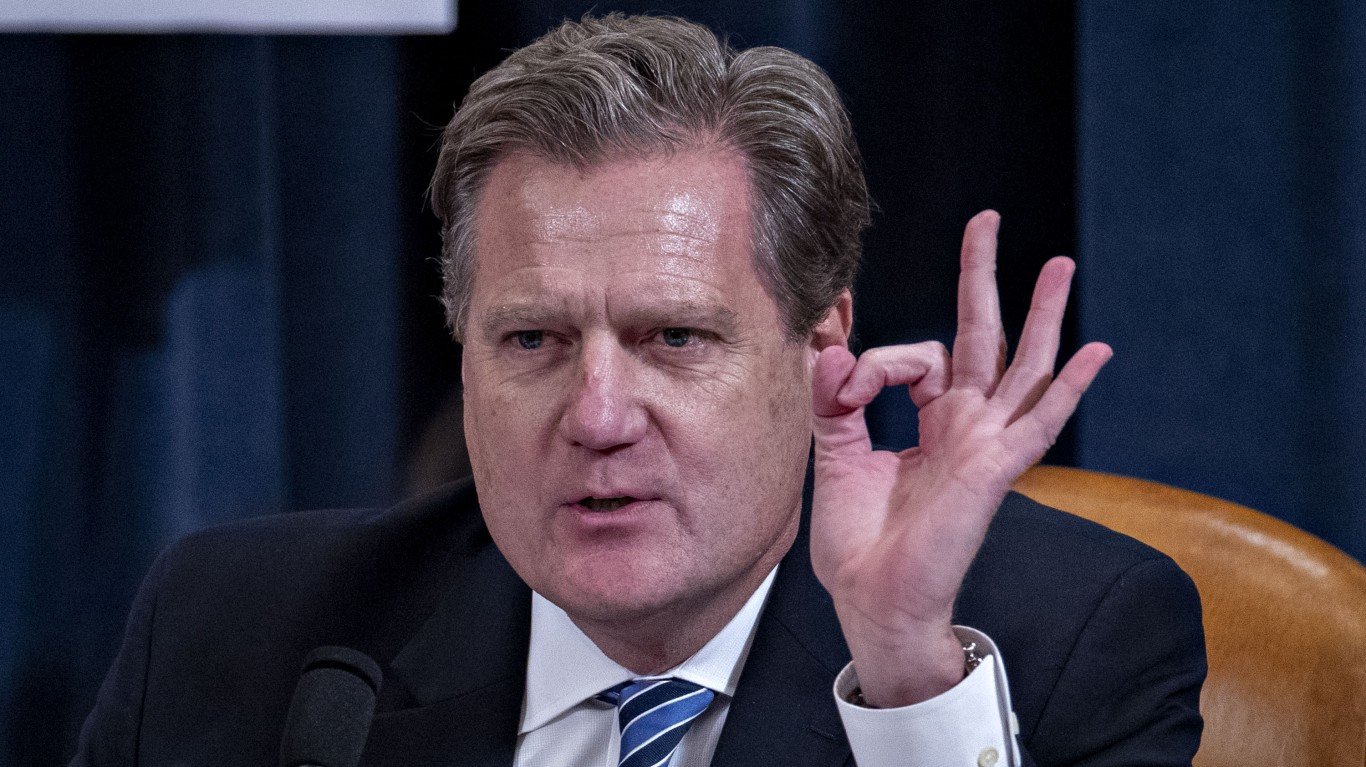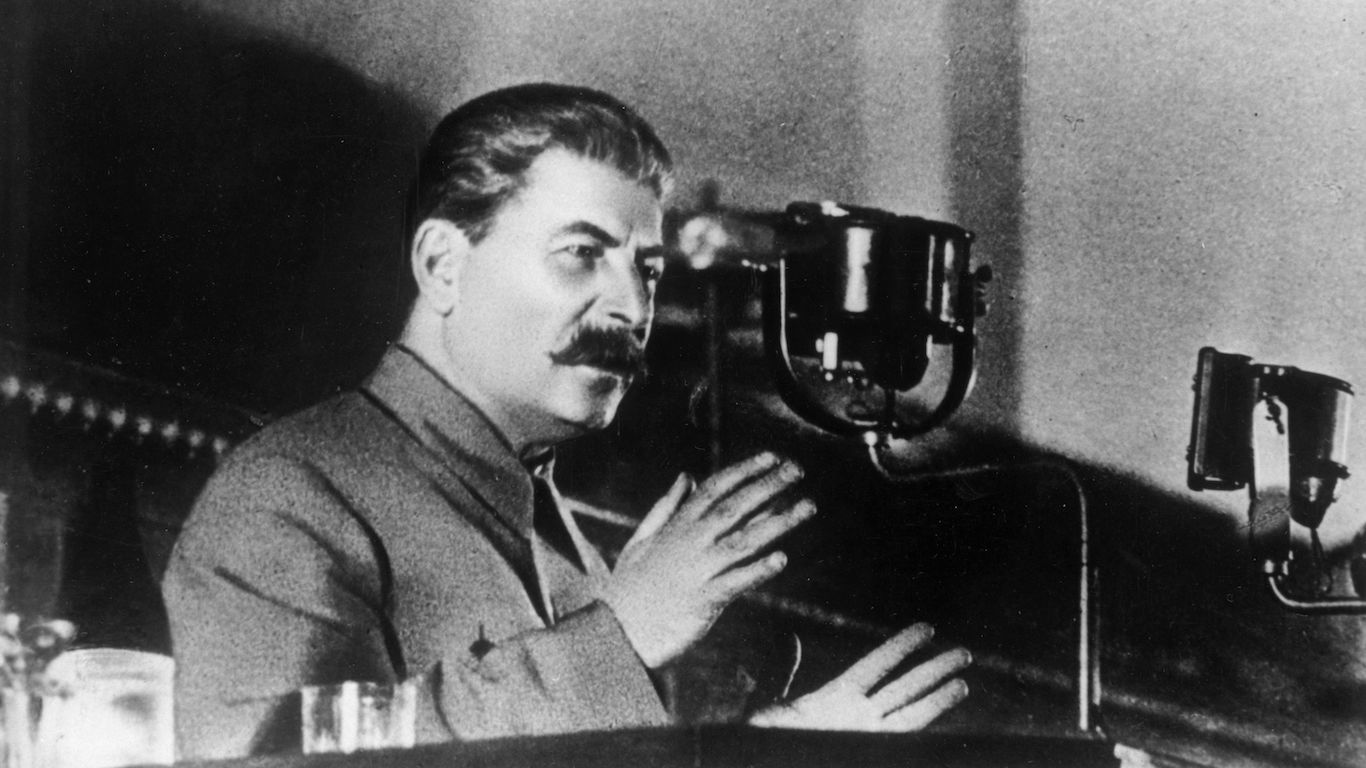

The President of the United States is often called the most powerful person in the world. This rings true, given the size of the U.S. military and the scope of its ideological and economic influence. But there are several other world leaders who can claim similar power given the population, wealth, and relative might of their nations, as well as political setups that allow them to enact their agenda more easily.
Even the most powerful leaders of today may not exert anywhere near the relative influence of some ancient rulers. In past centuries, a few dozen people came to control huge swaths of the globe and rule over huge percentages of the world’s total population.
24/7 Wall St. created a list of 50 of the most powerful leaders of all time. An argument can be made that every American president since 1945, as well as every leader of the former Soviet Union since the end of World War II, should be on the list. Some of those men do appear on the list. But in the interest of diversity and the understanding that power is relative to the era in which it is exercised, we have included leaders from the distant past as well as other figures such as religious, inspirational, and civil rights leaders.
The most powerful leaders in history have held many different titles — president, dictator, king, emperor, and pharaoh, as well as religious and other titles. These leaders have earned their power through free elections, charisma, philosophies, and brute force. Some of the most powerful leaders have been dead for millennia, while others were in power as of 2021.
A handful of leaders on the list achieved their power by amassing and maintaining followers with nothing more than ideals and philosophies. However, the vast majority of history’s most powerful leaders owe much of their power to their military strength. For much of human history, the only way to achieve power was to defeat your enemies in combat. More contemporary leaders, even in democratic nations, at least have the backing of a large military force. These are the countries with the world’s largest militaries.
Click here to see the most powerful leaders of all time.
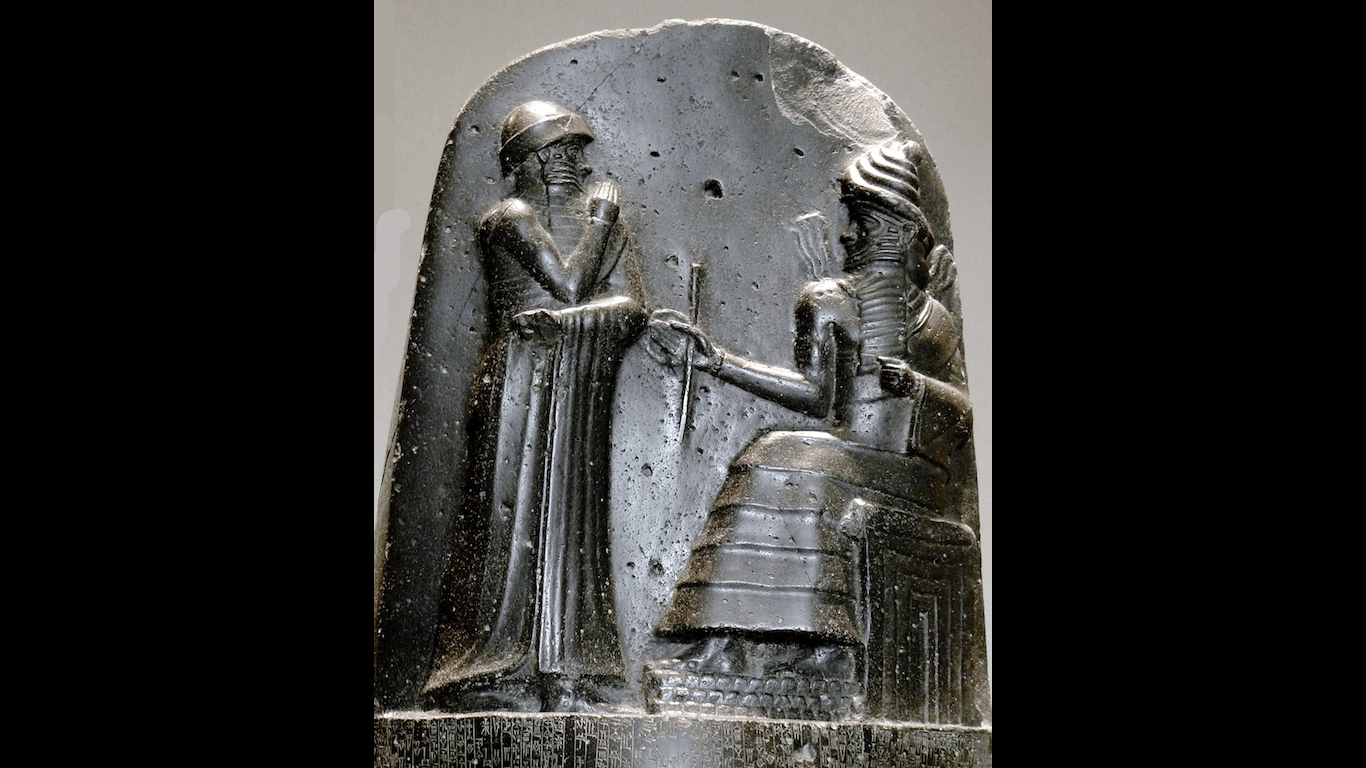
1. Hammurabi
> Nation/Territory: Ancient Babylon
> Title: King
> Time in power/Reign: 1792-1750 B.C.E.
> Known for: The oldest rendering of laws are named after him.
Hammurabi is the ancient Babylonian king who ruled Mesopotamia during the 18th century B.C. Hammurabi enlarged his kingdom by conquering rival kingdoms around the Tigris and Euphrates rivers to control agriculture and trade in the region.
Historians have assigned his name to a code of laws governing everyday life in the expanding empire. This code became the model for laws for subsequent civilizations.
[in-text-ad]
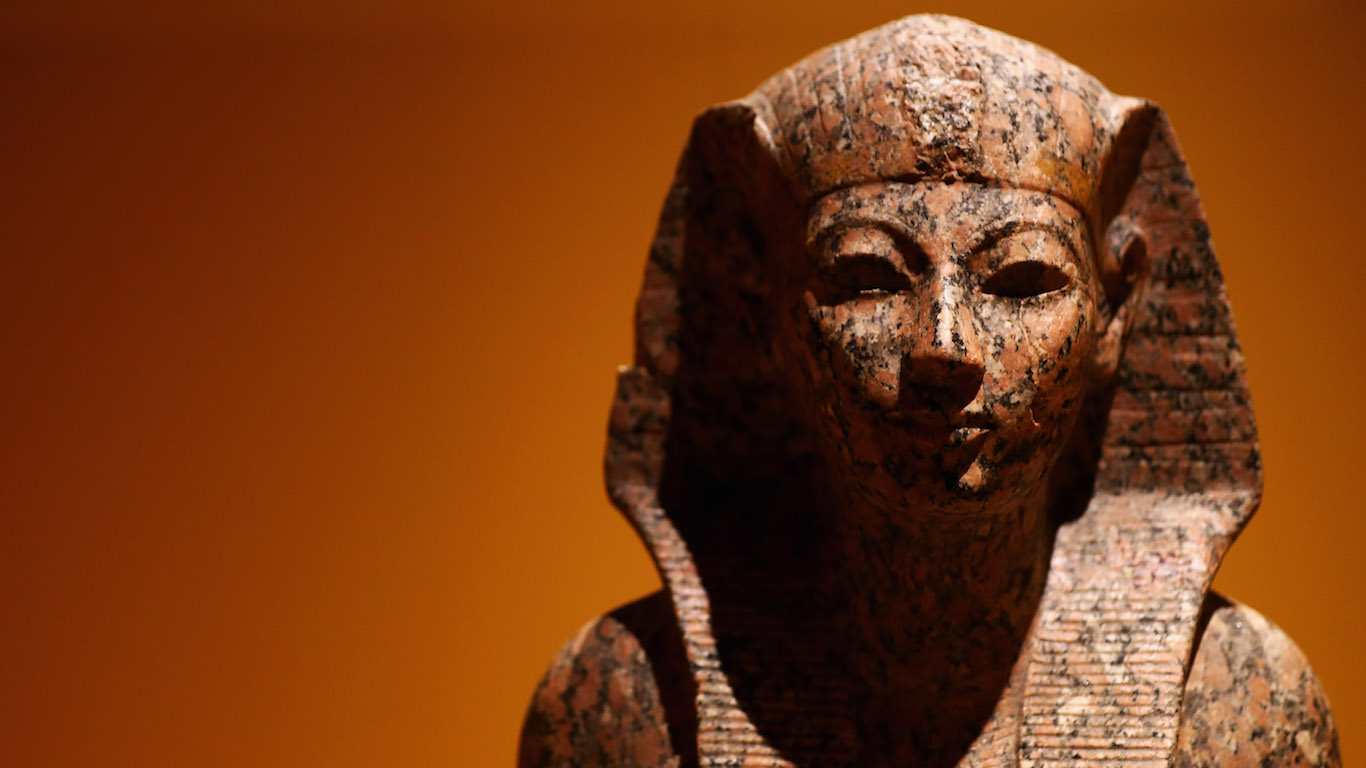
2. Hatshepsut
> Nation/Territory: Egypt
> Title: Pharaoh
> Time in power/Reign 1473-1458 B.C.E.
The Egyptian pharaoh Hatshepsut was one of history’s first woman leaders. She oversaw ambitious building projects and expanded trade. As a woman, Hatshepsut, which means “Foremost of Noble Women,” had to tread carefully as leader of Egypt and ordered many of the images of herself to be depicted as a man. Ancient Egyptian tradition prevented women from exercising the powers of pharaoh, but Hatshepsut did.
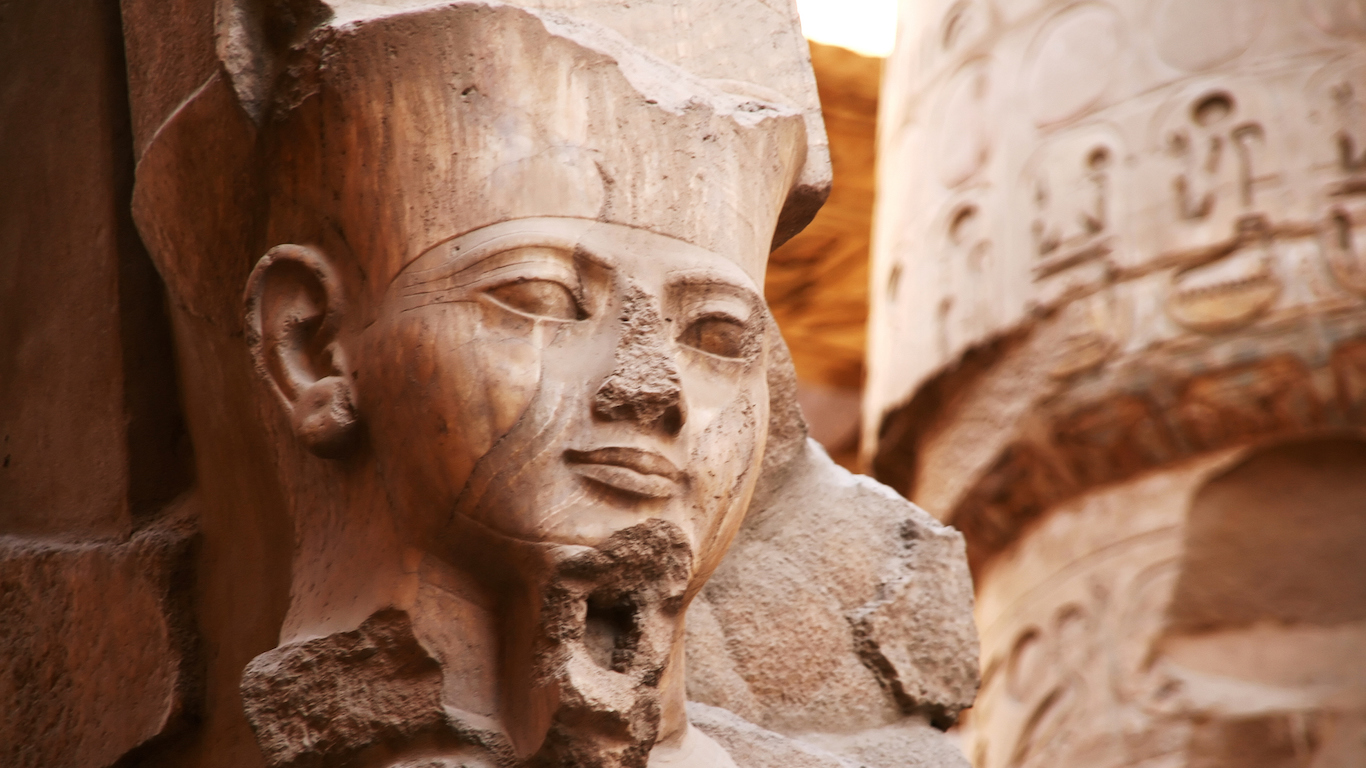
3. Ramses II
> Nation/Territory: Egypt
> Title: Pharaoh
> Time in power/Reign 1279-1213 B.C.E.
Ramses II was one of the most powerful pharaohs of ancient Egypt, and subsequent rulers considered it an honor to be descended from him. He was known for his military exploits in expanding the empire toward what is modern-day Syria and Lebanon, fighting constant wars with the Hittite empire.
Ramses learned the art of war from his father, Seti, who had his son accompany him on campaigns of conquest. The reign of Ramses was also marked by extensive temple building at Karnak, Luxor, and Abu Simbel.
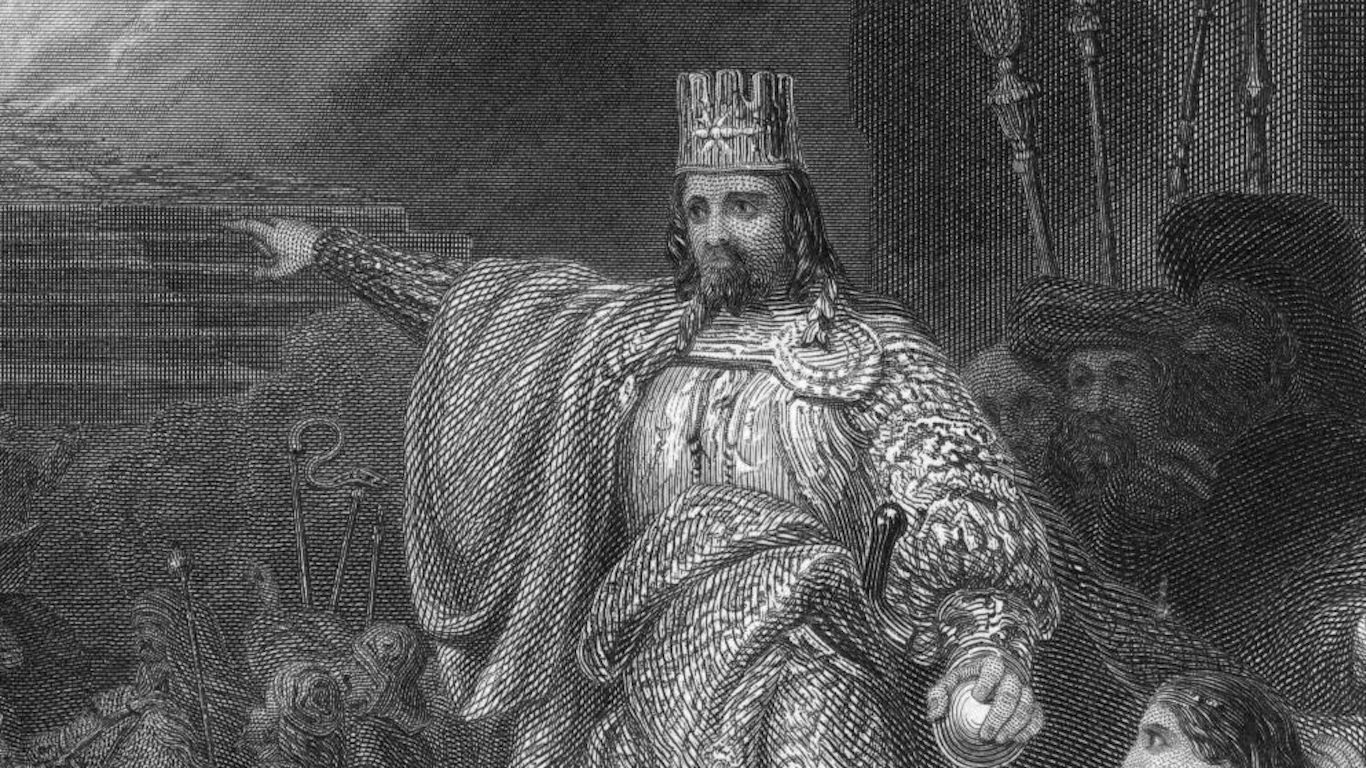
4. Nebuchadnezzar II
> Nation/Territory: Babylon
> Title: King
> Time in power/Reign 605-c. 562 B.C.E.
Nebuchadnezzar II built Babylon into one of the great powers of the ancient world. As a young military commander in his father’s army he defeated Egyptian forces at Carchemish to gain control of Syria. As a king, he took over portions of the Assyrian Empire and conquered Jerusalem.
Nebuchadnezzar II rebuilt the city Babylon into one of the wonders of the ancient world. A clay tablet from that era found in the ruins of the city of Sippar, north of Babylon, depicts the ancient world revolving around Babylon.
[in-text-ad-2]

5. Siddhartha Gautama Buddha
> Nation/Territory: Nepal/India
> Title: Religious leader
> Time in power/Reign: c. 563/480 – c. 483/400 B.C.E.
Siddhartha Gautama Buddha founded one of the world’s largest religions. Buddha was the son of a local ruler and was isolated from the outside world as a youth. Once he was exposed to the realities of the world, Buddha left his secluded existence to pursue a more spiritual life and try to relieve human suffering.
He practiced an ascetic lifestyle, meditating, fasting, and enduring physical hardships. Buddha advocated following a path of balance called the Middle Way. Buddhism is practiced by more than 500 million people worldwide, though estimates vary.

6. Cyrus the Great
> Nation/Territory: Persian Nation/Territory
> Title: Emperor
> Time in power/Reign: 550-530 B.C.E.
Cyrus the Great, also referred to as Cyrus II of Persia or simply Cyrus, founded the Persian Empire under the Achaemenid dynasty. He went on to conquer the Medes (located in the ancient country of Media) and later the Babylonian Empire. Cyrus also penned the Cyrus Cylinder, which is considered to be the first charter of human rights.
[in-text-ad]

7. Alexander the Great
> Title: King
> Country: Ancient Macedonia
> Time in power/Reign 336-323 B.C.E.
Alexander the Great rose to power at age 19 following the murder of his father, King Philip II, and conquered much of the known world. Alexander, the king of Macedonia, reorganized the Greek city-states into the Corinthian League by brute force. He then marched eastward and conquered the Persian Empire, before turning west and conquering Egypt — there he built the city of Alexandria, which became a center of commerce and Greek culture.
Alexander’s reign was marked by a fusion of Greek and eastern cultures. His path of conquest to the east took him to Iran and as far east as the Ganges River in northern India. Alexander contracted malaria and died at age 32.
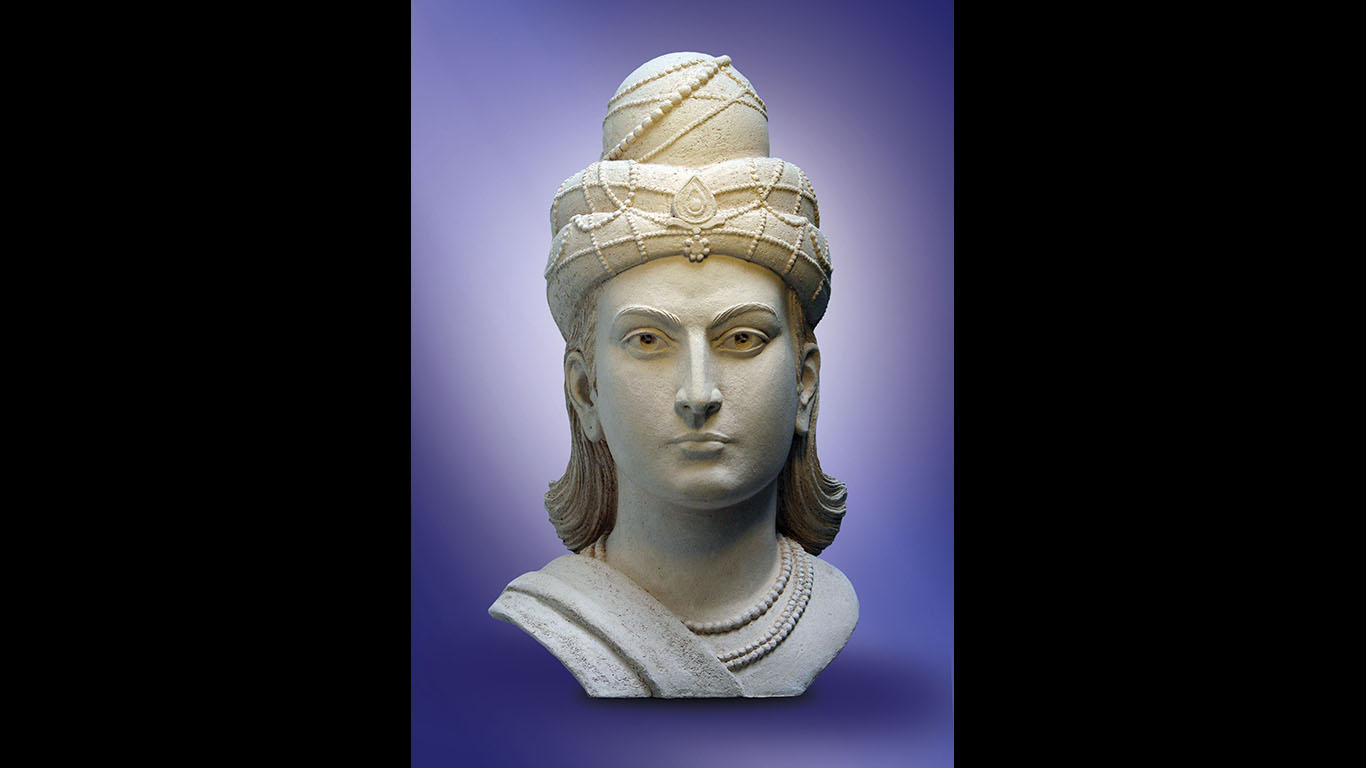
8. Ashoka the Great
> Nation/Territory: Present-day India
> Title: Emperor
> Time in power/Reign: 268-232 B.C.E.
Ashoka the Great was emperor of the Indian Mauryan Empire, one of the largest empires in the world at the time with an estimated 30 million people. Though he began as a notoriously cruel leader, Ashoka ultimately rejected armed conquest and adopted a policy of self-described “conquest by dharma,” based on his dedication to Buddhist teachings.
Ashoka expressed regret over the exceptionally brutal war he waged against the state of Kalinga — which resulted in 300,000 casualties — and spent the remainder of his time as emperor spreading peace and prosperity throughout India and supporting such concepts as religious tolerance, aid for the needy, and respect for elders.
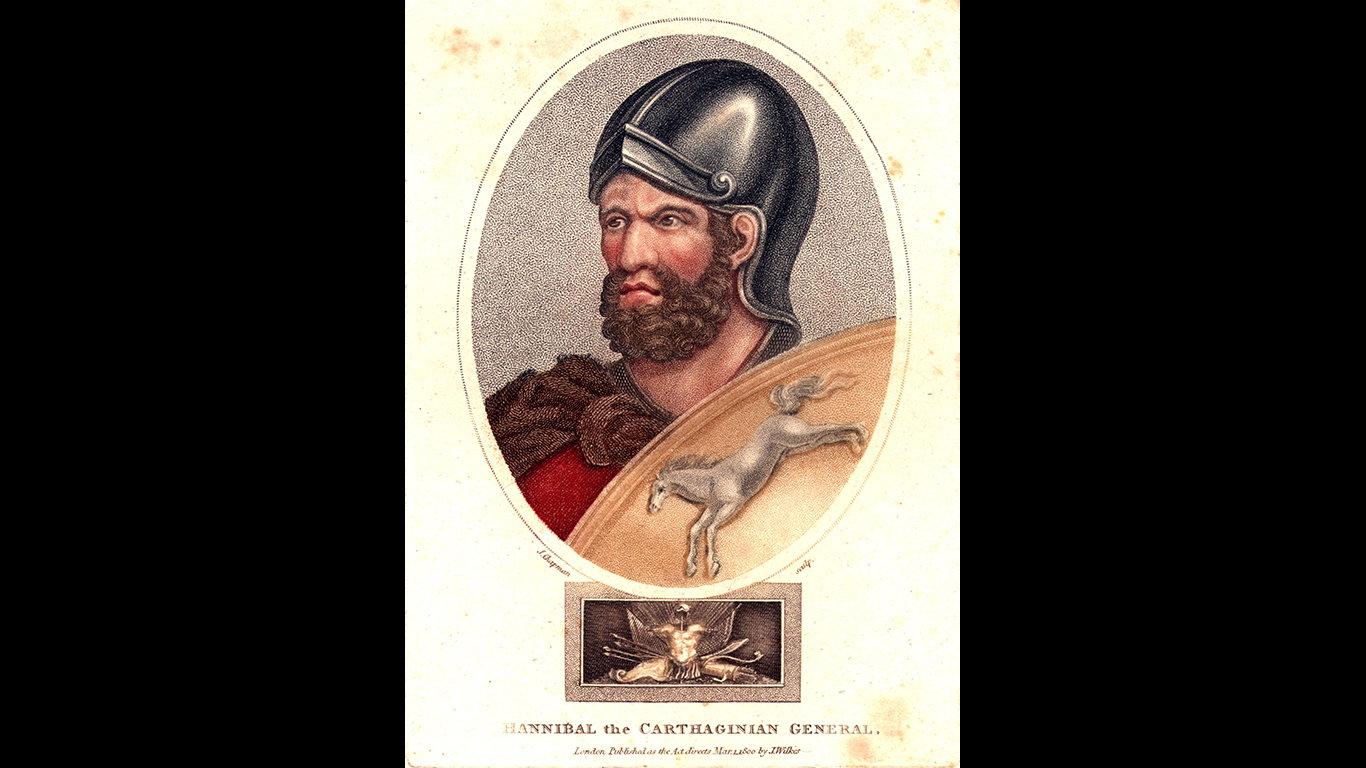
9. Hannibal Barca
> Nation/Territory: Carthage
> Title: General
> Time in power/Reign: 241-183 B.C.E.
Hannibal Barca — more commonly known as Hannibal — was a Carthaginian general during the Second Punic War, which raged between North Africa’s Carthage and Rome from 218 to 202 B.C. He is considered to be one of history’s greatest generals and is remembered in part for leading the Carthaginian army — with a team of elephants in tow — across southern Europe and the Alps Mountains. Hannibal was eventually defeated, and after being sent into exile he took his own life by ingesting poison.
[in-text-ad-2]
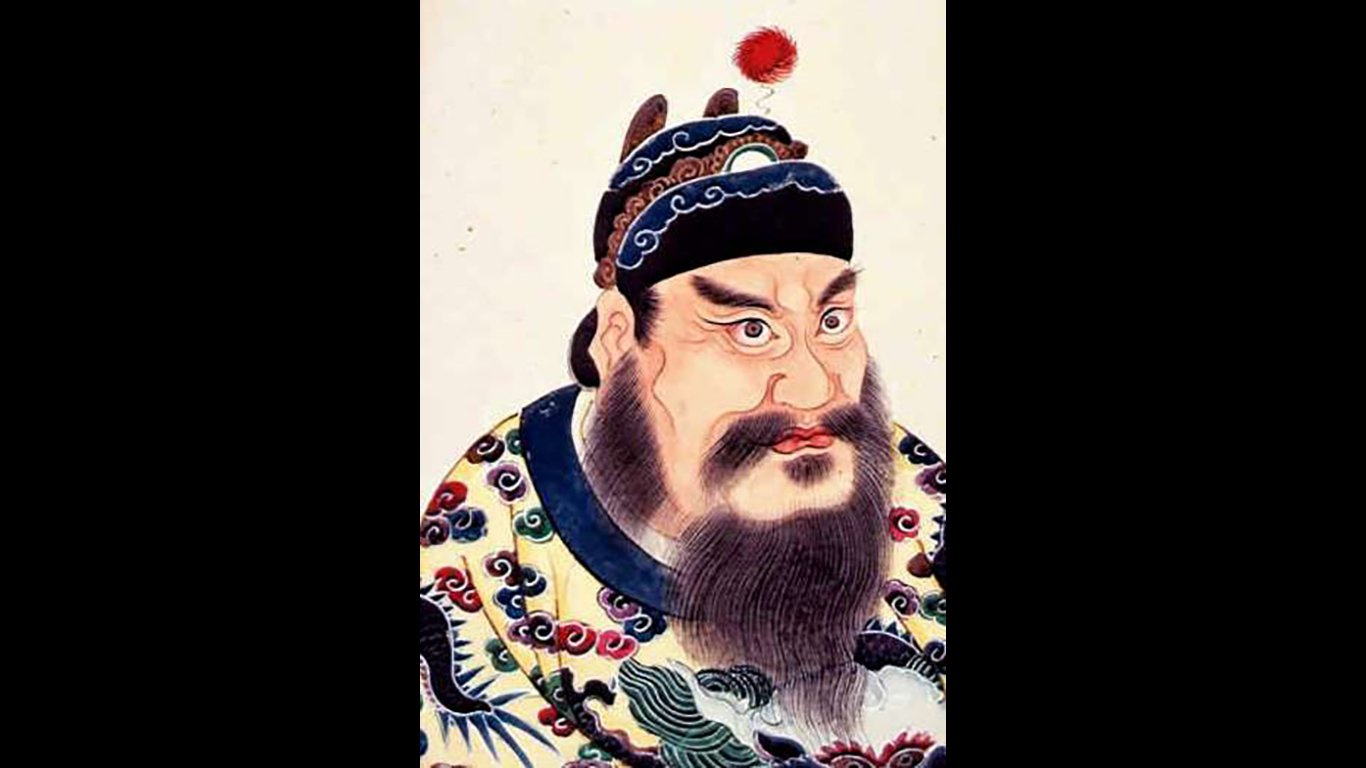
10. Qin Shi Huang
> Nation/Territory: Present-day China
> Title: Emperor
> Time in power/Reign: 221-210 B.C.E.
Shihuangdi, also known as Qin Shi Huang, was the first emperor of unified China. He came from the Qin state in northwest China, a region ruled by a totalitarian system that developed a strong bureaucracy and military. Once Qin became of age as king of the Qin state, he eliminated the leaders of rival states and unified China.
Under Qin, China standardized weights and measures, built roads and canals, and erected physical defenses to bolster the Great Wall against invasion threats from the north. After Qin died, his tomb was carved out of a mountain formed into a compound guarded by 8,000 terra-cotta soldiers discovered in 1974.

11. Julius Caesar
> Nation/Territory: Ancient Rome
> Title: Dictator
> Time in power/Reign: 46-44 B.C.E.
Julius Caesar gained fame as a great military leader who conquered Gaul (mostly modern France) and led military campaigns against Britain. When he returned to Italy, he flouted the senate’s authority by refusing to disband his army before entering Rome. That led to a civil war from which he emerged victorious.
As dictator (originally a temporary position), Julius Caesar supported reforms and oversaw large public works projects in Rome. Shortly after declaring himself dictator for life, he was assassinated by members of the Roman senate on March 15, 44 B.C.
[in-text-ad]
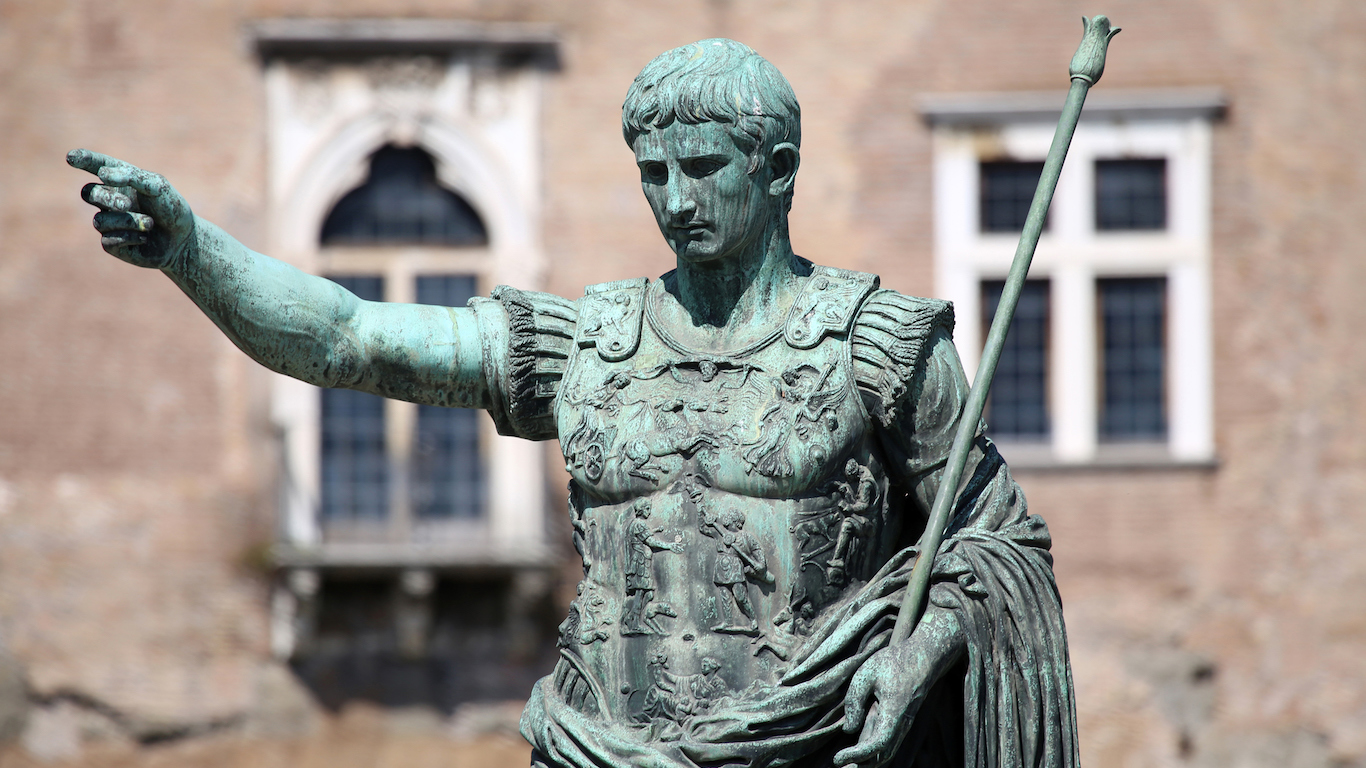
12. Augustus Caesar
> Nation/Territory: Ancient Rome
> Title: Emperor
> Time in power/Reign: 27 B.C.E.-14 C.E.
Born Gaius Octavius Thurinus, Augustus Caesar, the great-nephew of Julius Caesar, was the first emperor of Rome. Octavian battled both Cleopatra VII and Marc Antony and their armies prior to ascending to power as emperor. Under his rule, the empire was peaceful and prosperous.

13. Jesus Christ
> Nation/Territory: Present-day Israel
> Title: Religious leader
> Time in power/Reign: c. 0 B.C.E.-c. 30/33 C.E.
Jesus Christ is the most important figure in Christianity, which with more than 2.3 billion followers is the largest religion in the world. Accounts of the religious leader’s life and ministry are recorded in the New Testament of the Bible.
Jesus began teaching his views and path of humility, compassion, and love for one another. Fearful of the power of his followers, clerics conspired with the Roman rulers to arrest and eventually crucify Jesus.

14. Marcus Aurelius
> Nation/Territory: Ancient Rome
> Title: Emperor
> Time in power/Reign: 161-180
Roman emperor Marcus Aurelius is remembered both for his political career and his philosophical pursuits. He ruled during the Parthian Wars and battled against the Germanic tribes. He also authored the famous philosophical work “Meditations,” which outlines his stoic outlook and covers many of his views about life.
[in-text-ad-2]
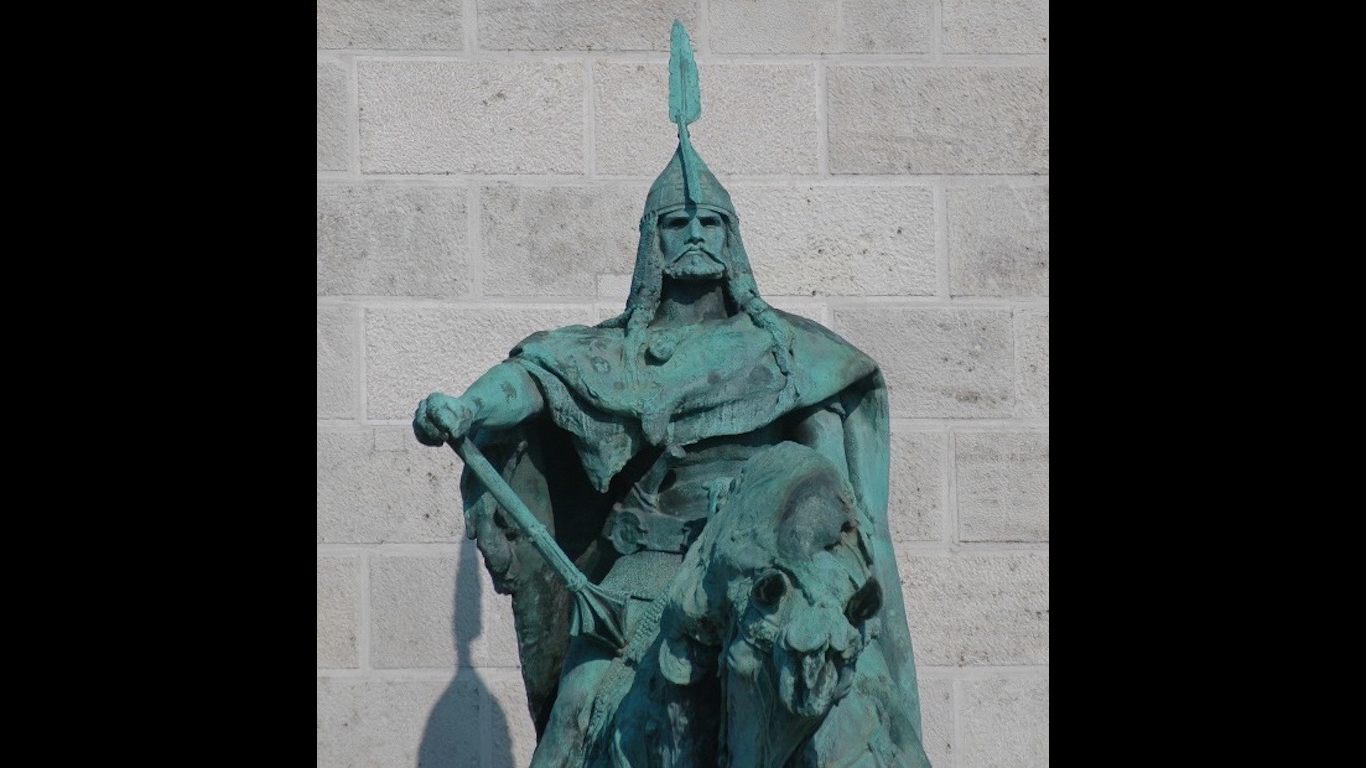
15. Attila the Hun
> Nation/Territory: Hunnic Nation/Territory
> Title: King
> Time in power/Reign: 434-453
Attila the Hun, leader of a nomadic tribe originating in central Asia, became synonymous with terror and rampage in central and eastern Europe in the fifth century. Attila, called “the scourge of God,” took advantage of the decline of the Roman Empire to conquer vast swaths of Europe. His empire extended from central Asia to modern France. The Hun empire dissolved in the year following Attila’s death in 453.

16. Muhammad
> Nation/Territory: Present-day Saudi Arabia
> Title: Prophet
> Time in power/Reign: 610-632
Muhammad was the prophet and founder of Islam whose revelations from Allah are the basis for the Koran. He spread Islam throughout the majority of Arabia by 630. Today, there are just under 2 billion Muslims worldwide. Muslims believe Muhammad was the prophet of God as in the prayer, “There is no God but Allah, and Muhammad is his prophet.”
[in-text-ad]
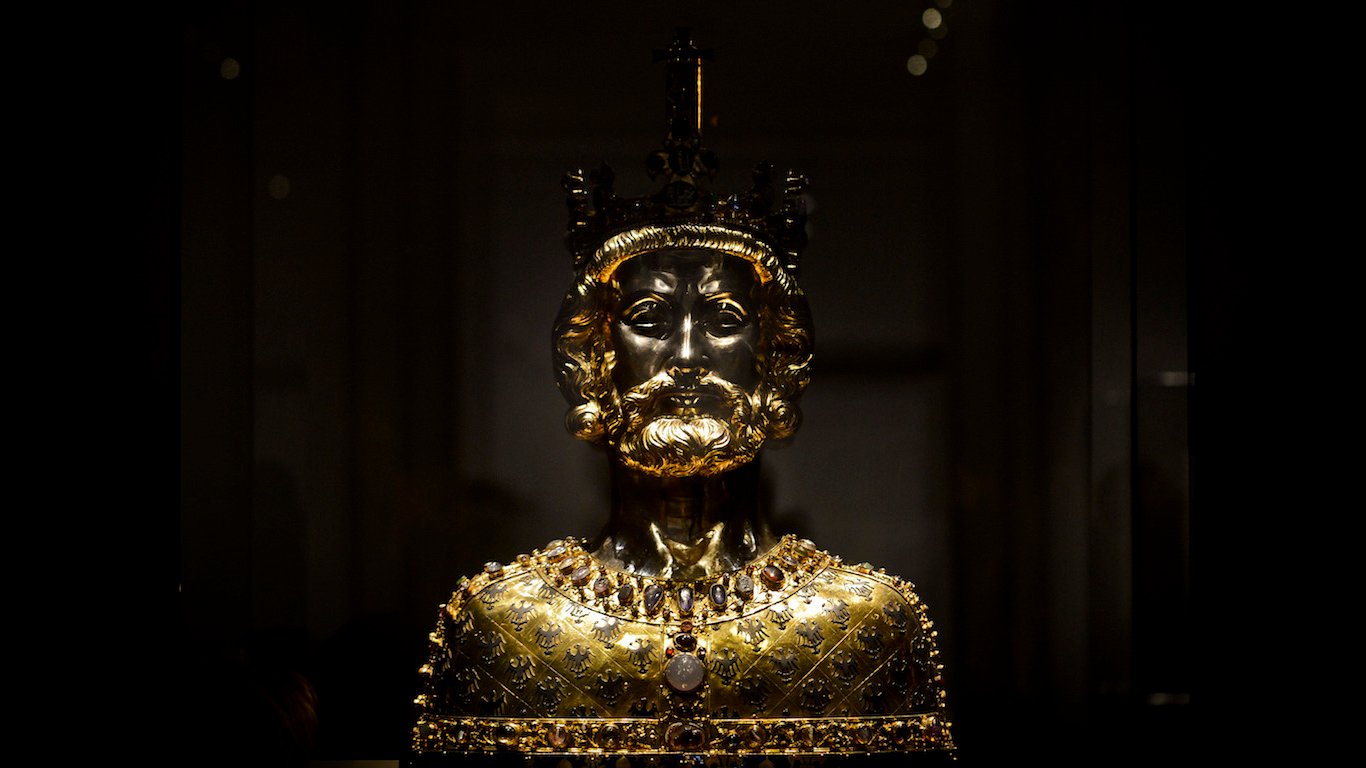
17. Charlemagne
> Nation/Territory: Holy Roman Nation/Territory
> Title: Emperor
> Time in power/Reign: 768-814
It was the ambition of Charlemagne, king of the Franks, to unite the Germanic tribes and convert them to Christianity. His empire included present-day France, western Germany, Belgium, and Luxembourg. Charlemagne filled the power void left by the fall of the Roman Empire.
Charlemagne was crowned by Pope Leo III as Emperor of the Romans on Christmas Day in the year 800, marking the founding of the Holy Roman Empire. He presided over economic reforms and a standardized form of writing became the basis for printed alphabet.

18. Genghis Khan
> Nation/Territory: Mongol Nation/Territory
> Title: Khan or leader
> Time in power/Reign: 1206-1227
Ganghis Khan was a Mongolian warrior-ruler who conquered tribes across Asia, leading to a unified Mongolia. Under his rule, the Mongol armies pillaged and conquered from the Adriatic Sea to the Pacific coast of China. He is considered a military genius whose great success was due in part to organization, mobility, and brutality.
In addition to revolutionizing warfare, Genghis Khan presided over the largest empire in history. The Mongol Empire under Genghis Khan spread such technologies as paper and paper money, gunpowder, and trousers.
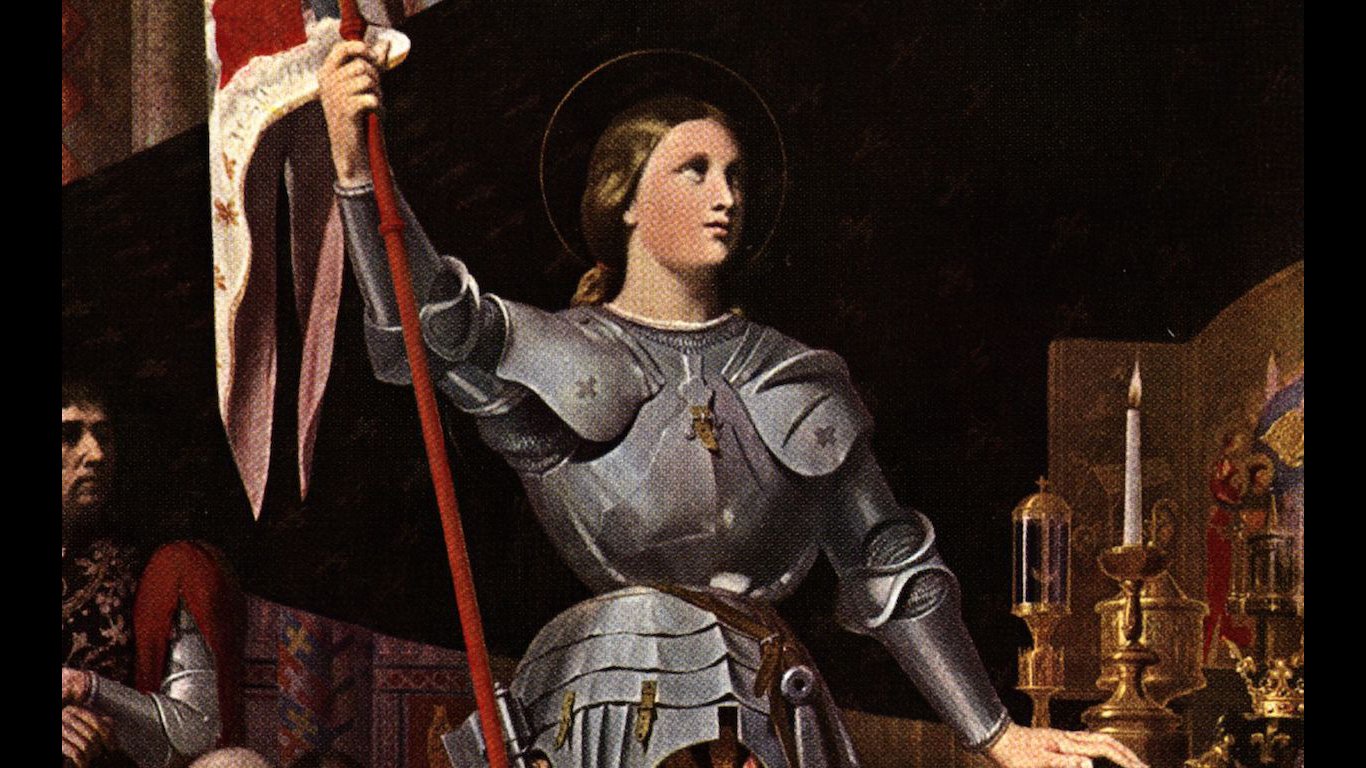
19. Joan of Arc
> Nation/Territory: France
> Title: Military Leader
> Time in power/Reign: 1428-1431
Joan of Arc was an early symbol of French nationalism. She claimed God had chosen her to lead the French against the English and their Burgundian allies during the Hundred Years’ War. Joan convinced Prince Charles of Valois to allow her command an army against France’s enemies, and she triumphed over them at Orléans. Joan was captured by the English and Burgundians, tried as a witch, and burned at the stake at age 19. Joan was officially canonized as a saint in 1920.
[in-text-ad-2]
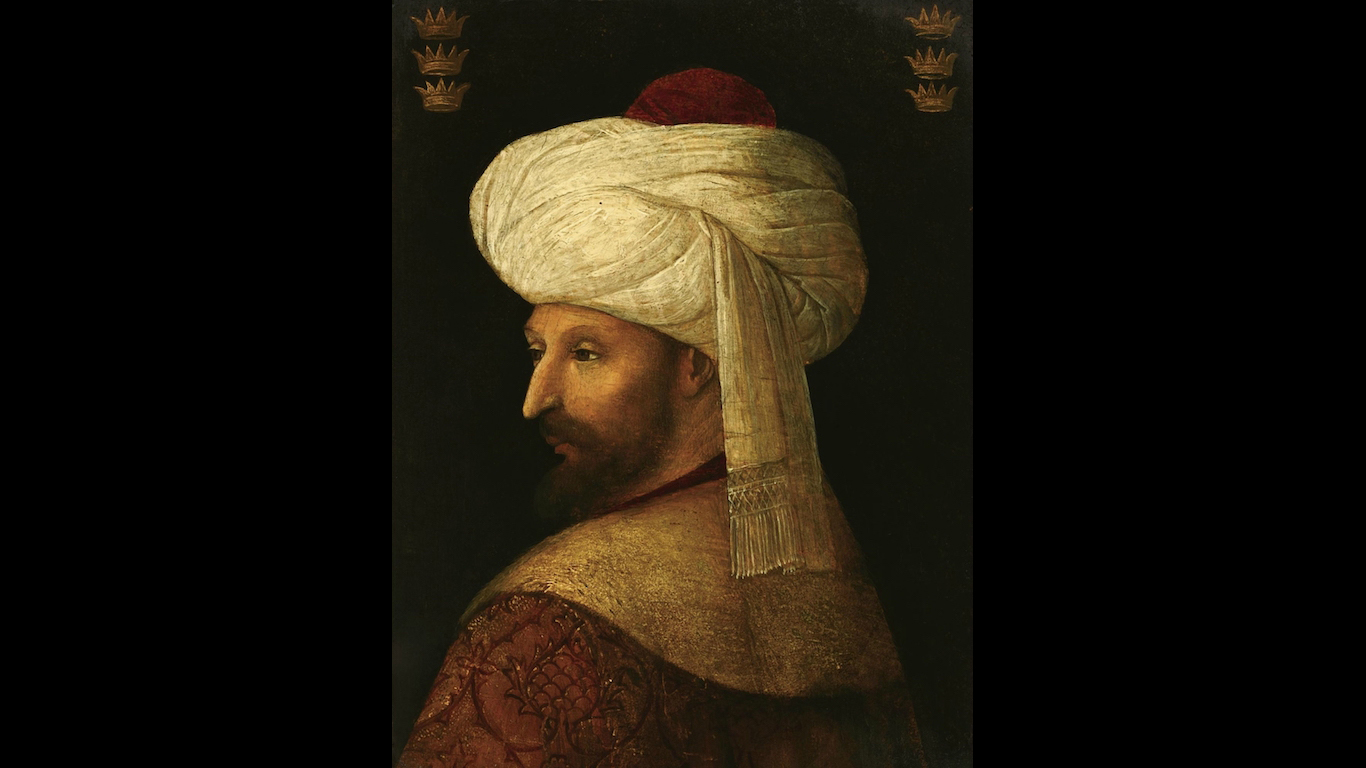
20. Mehmed II
> Nation/Territory: Ottoman Nation/Territory
> Title: Sultan
> Time in power/Reign: 1444-1446, 1451-1481
Mehmed II, or Mehmed the Conqueror, was an Ottoman sultan, statesman, and military leader. He captured Constantinople (now Istanbul) in 1453 and expanded the Ottoman empire to include territories in Anatolia and the Balkans. His actions resulted in the Turkish Empire becoming a major world power for four centuries.
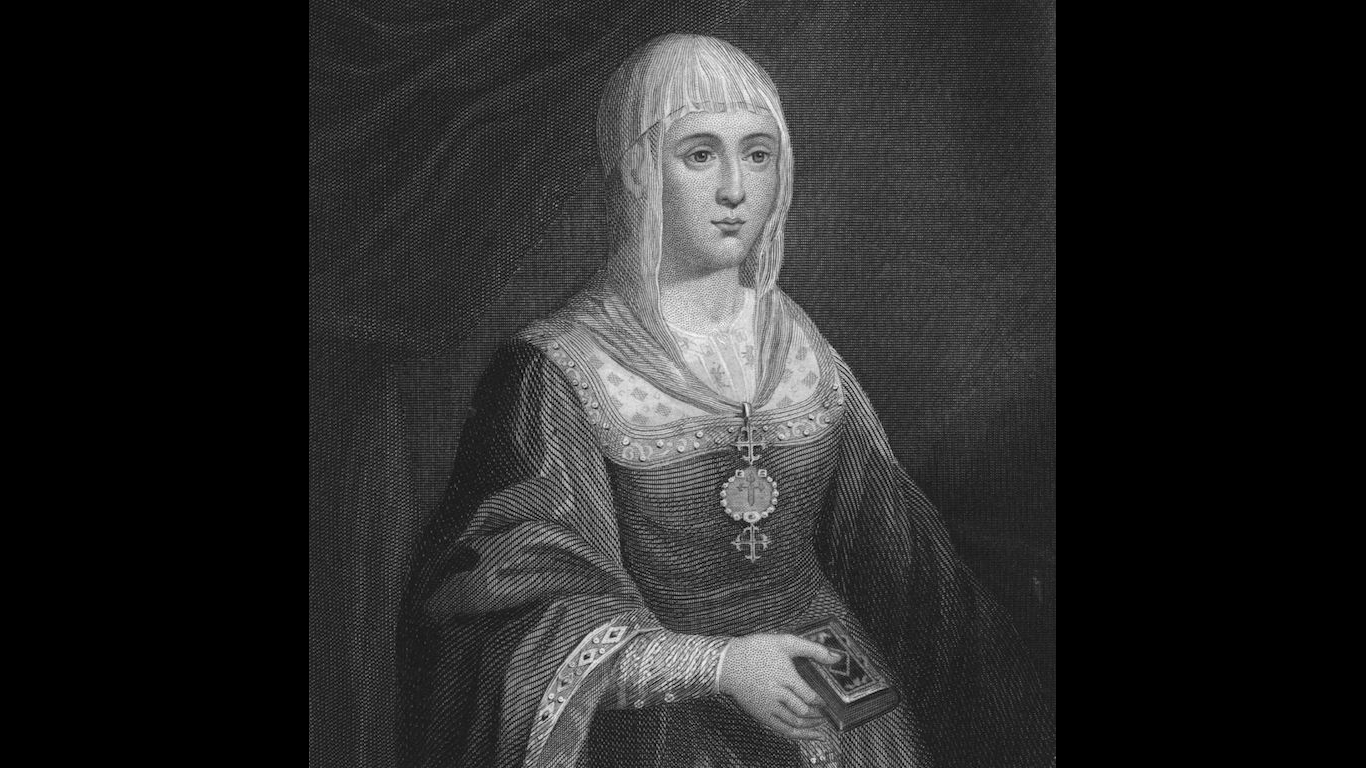
21. Isabella I
> Nation/Territory: Spain
> Title: Queen
> Time in power/Reign: 1479-1504
Isabella, queen of Castile and Aragon, along with her husband King Ferdinand, is famous for unifying Spain by expelling the Muslim Moors. She also is known for bankrolling Christopher Columbus’ trip to the Western Hemisphere that helped create the Spanish empire and vault Spain into a world power.
During her reign, as a Catholic queen, the Jews were expelled from Spain and the Inquisition oppressed non-Christians.
[in-text-ad]

22. Martin Luther
> Nation/Territory: Germany
> Title: Leader of Reformation movement
> Time in power/Reign: 1517-1546
The German monk sparked the Protestant Reformation after nailing his “95 Theses”’ to a church door in 1517. Luther questioned many basic tenets of Roman Catholicism, such as the selling of indulgences, which led to the creation of Protestantism, beginning with Lutheranism, and thereby altering institutional Christianity forever.
Luther also translated the Bible to German from Latin so that it would be more accessible for the common man.
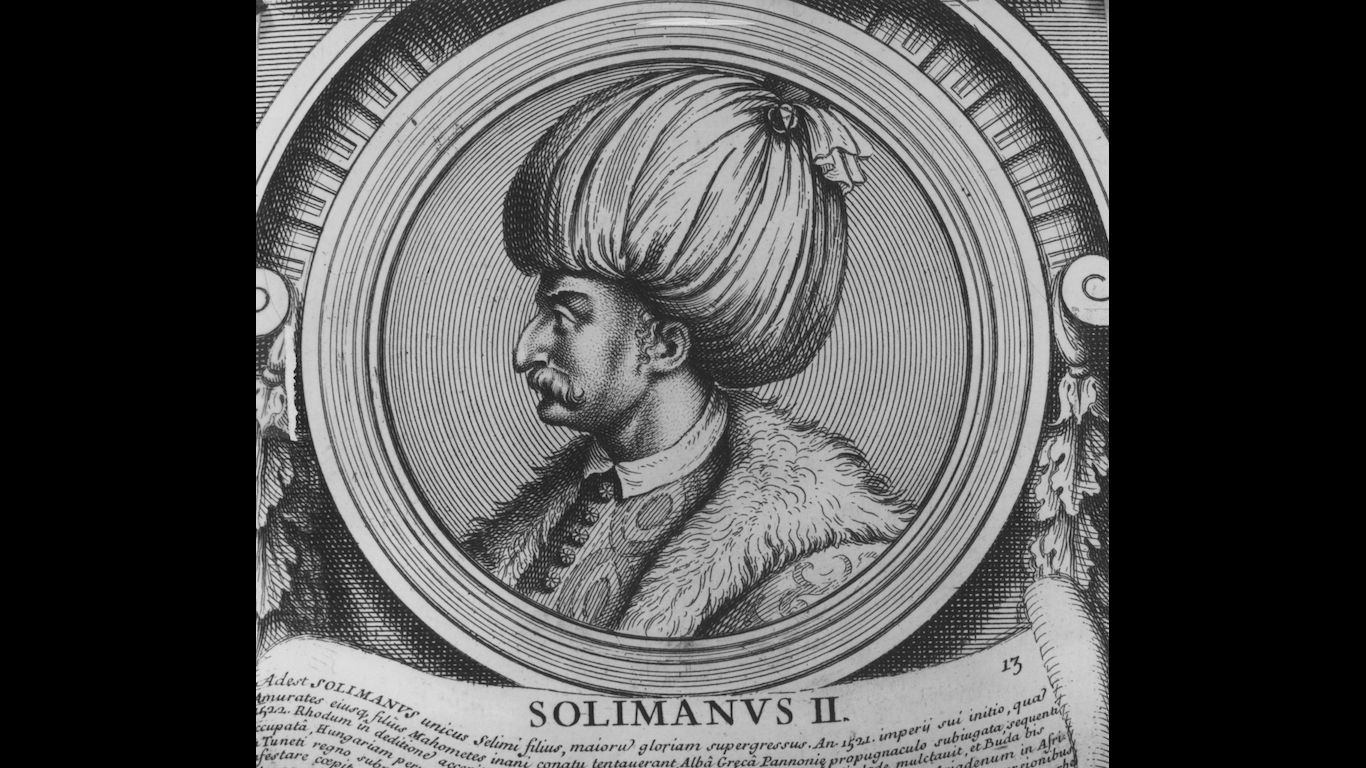
23. Süleyman the Magnificent
> Nation/Territory: Ottoman Nation/Territory
> Title: Sultan
> Time in power/Reign: 1520-1566
Süleyman the Magnificent, sultan of the Ottoman Empire, extended his realm into eastern and central Europe. The advance of the Ottoman Empire in Europe was halted in Hungary, and Süleyman turned east. He conquered Iraq but was unable to subdue Persia. It was during Süleyman’s reign that there was a flowering of Islamic culture, including architecture, education, and public works. Istanbul became one of the great cities of the world during Süleyman’s rule.

24. Elizabeth I
> Nation/Territory: United Kingdom
> Title: Queen
> Time in power/Reign: 1558-1603
Elizabeth I was the queen of England during what is referred to as the Elizabethan Age, from 1558 to 1603. The Protestant queen succeeded her zealously Catholic half-sister Mary I and initiated in Protestant reforms. Elizabeth was an exceptionally popular monarch in her country and helped usher in the English Renaissance and development of England into a world power.
[in-text-ad-2]
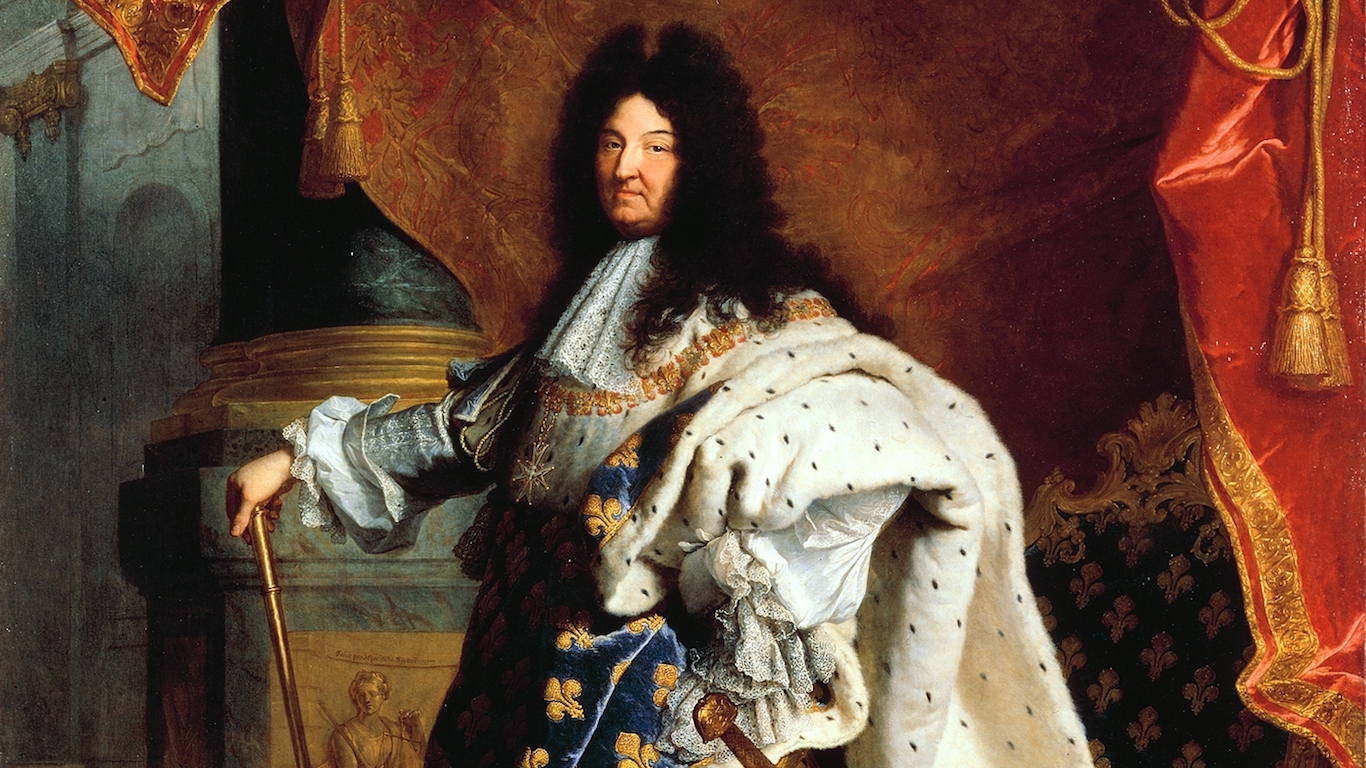
25. Louis XIV of France
> Nation/Territory: France
> Title: King
> Time in power/Reign: 1643-1715
Louis XIV was called the “Sun King,” and his reign symbolized absolute monarchy. Louis ruled France for 72 years — the longest of any European monarch — during a period noteworthy for the formation of France as a modern nation-state as well as significant territorial expansion in the Western Hemisphere. Louis considered himself a defender of the Catholic faith and expelled the Protestant Huguenots from France in the late 17th century.
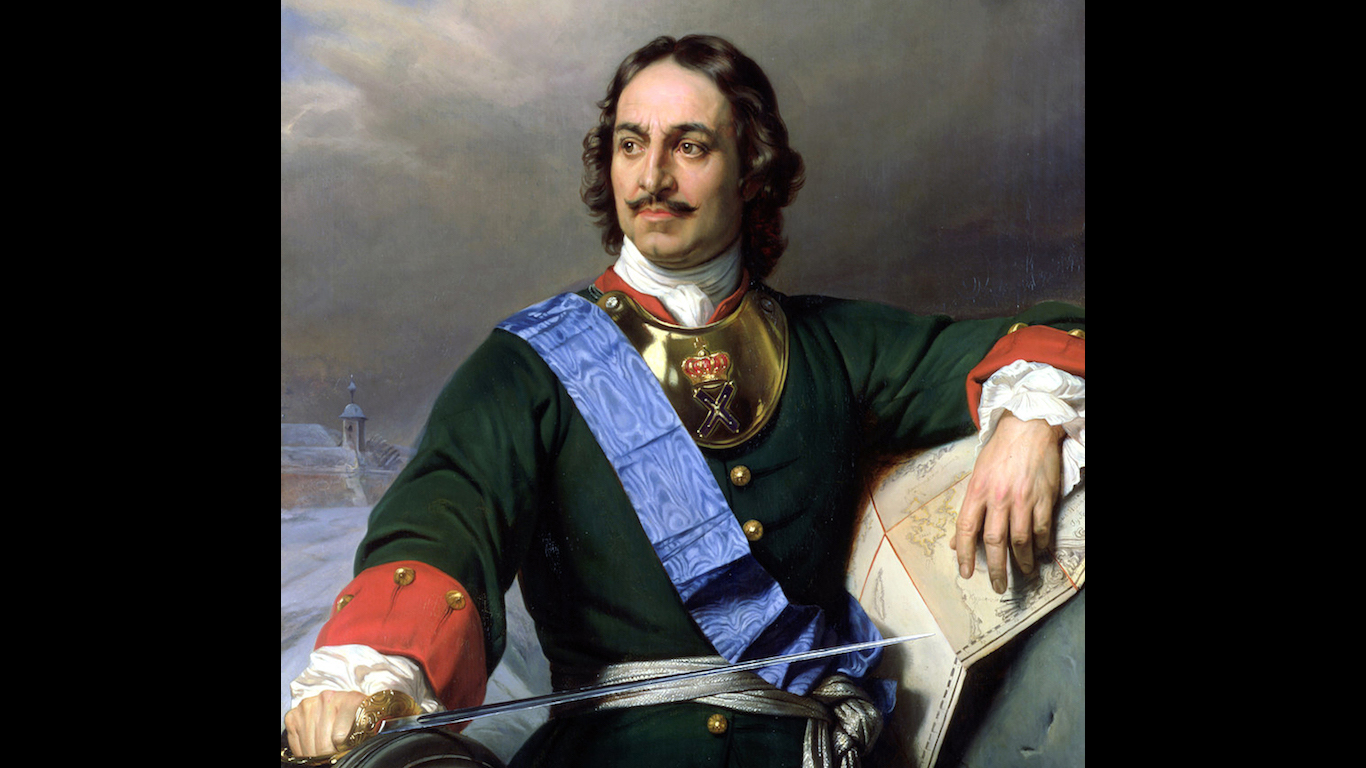
26. Peter the Great
> Nation/Territory: Russia
> Title: Tsar
> Time in power/Reign: 1682-1725
Peter the Great passed comprehensive military, political, economic, and cultural reforms as tsar — and later emperor — of Russia. He also greatly expanded the Russian empire’s geographic reach and founded the one-time Russian capital of St. Petersburg. He continues to be a beloved figure across Russia, and especially so in St. Petersburg.
[in-text-ad]
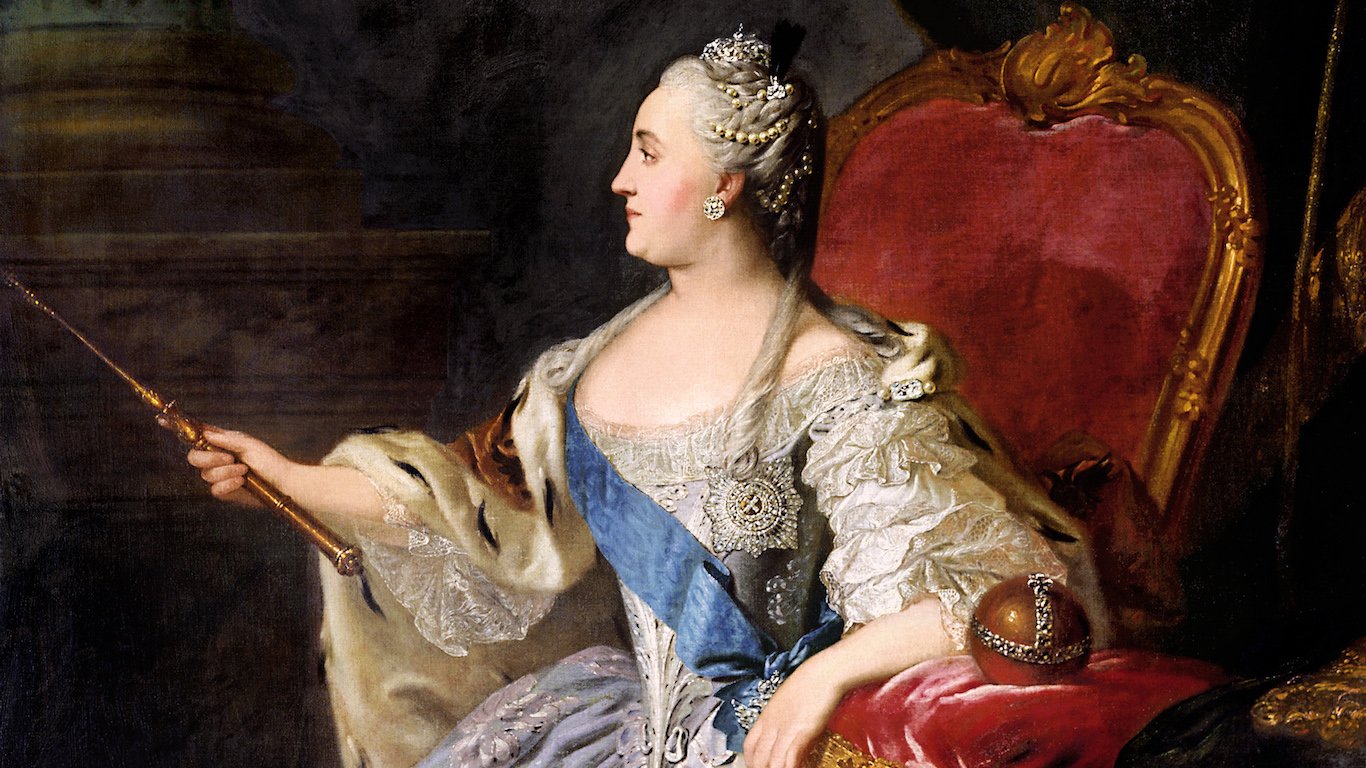
27. Catherine the Great
> Nation/Territory: Russia
> Title: Empress
> Time in power/Reign: 1762-1796
The Prussian-born monarch carried on the legacy of Peter the Great, modernizing Russia and expanding the Russian Empire by adding Crimea and sections of Poland. Catherine was able to grow the empire by exercising her diplomatic skills to keep Russia out of wars with European powers. Catherine was educated and considered herself “a friend of the Enlightenment,” but she was ambitious and could be ruthless, suppressing revolution mercilessly.

28. Napoleon Bonaparte
> Nation/Territory: France
> Title: Emperor
> Time in power/Reign: 1804-1814, 1815
Considered one of the world’s greatest military leaders, Napoleon Bonaparte was a French general who appointed himself as the first emperor of France. In addition to forever changing military organization, he enacted the Napoleonic Code — a new legal code that gave post-revolutionary France its first established set of laws regarding crime, property, family, and individual rights in 1804.
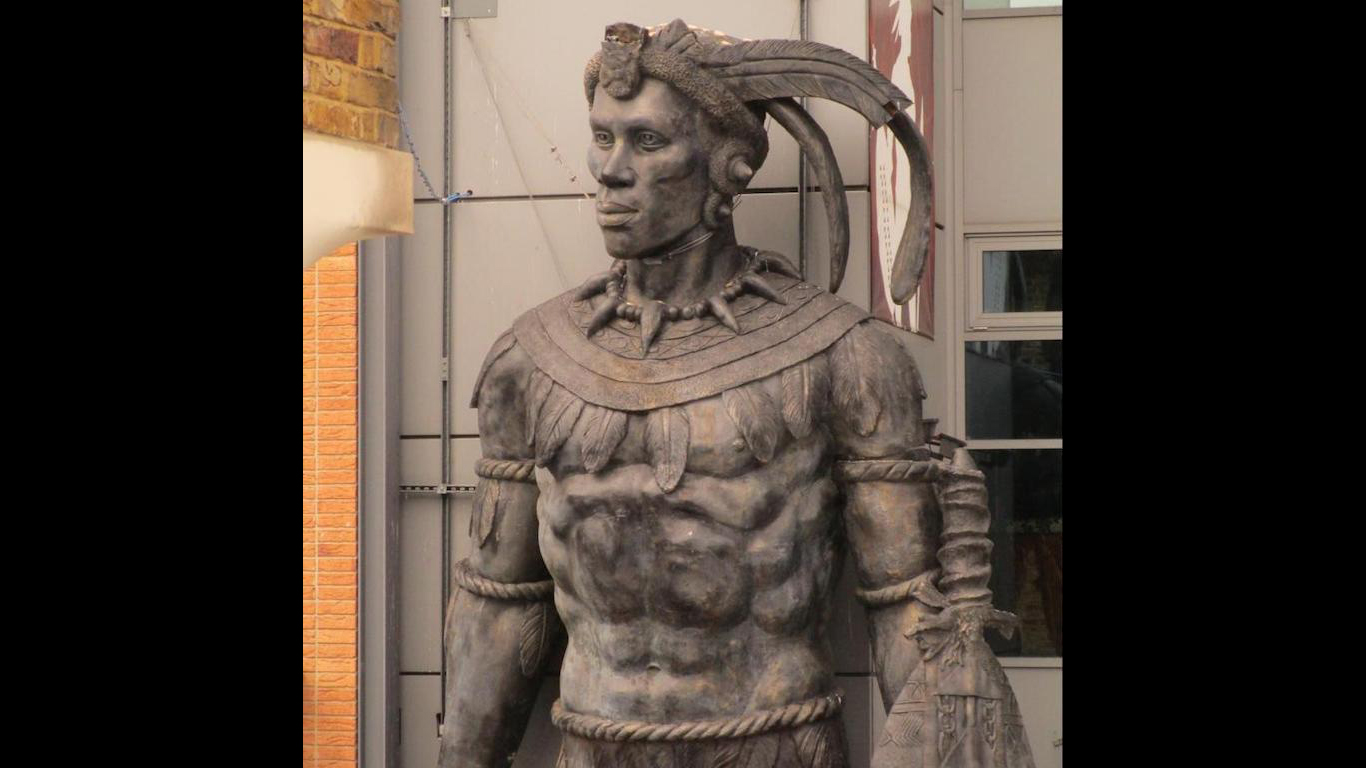
29. Shaka Zulu
> Nation/Territory: Present-day Natal Province
> Title: Monarch
> Time in power/Reign: 1816-1828
Shaka Zulu was a fearsome warrior ruler whose organizational skills and emphasis on discipline united more than 100 chiefdoms into one Zulu kingdom in what is present-day South Africa. He forged good relations with early European traders in the 1820s and was eager to learn their culture and their technological achievements. He was assassinated by his half-brothers and bodyguards in 1828.
[in-text-ad-2]
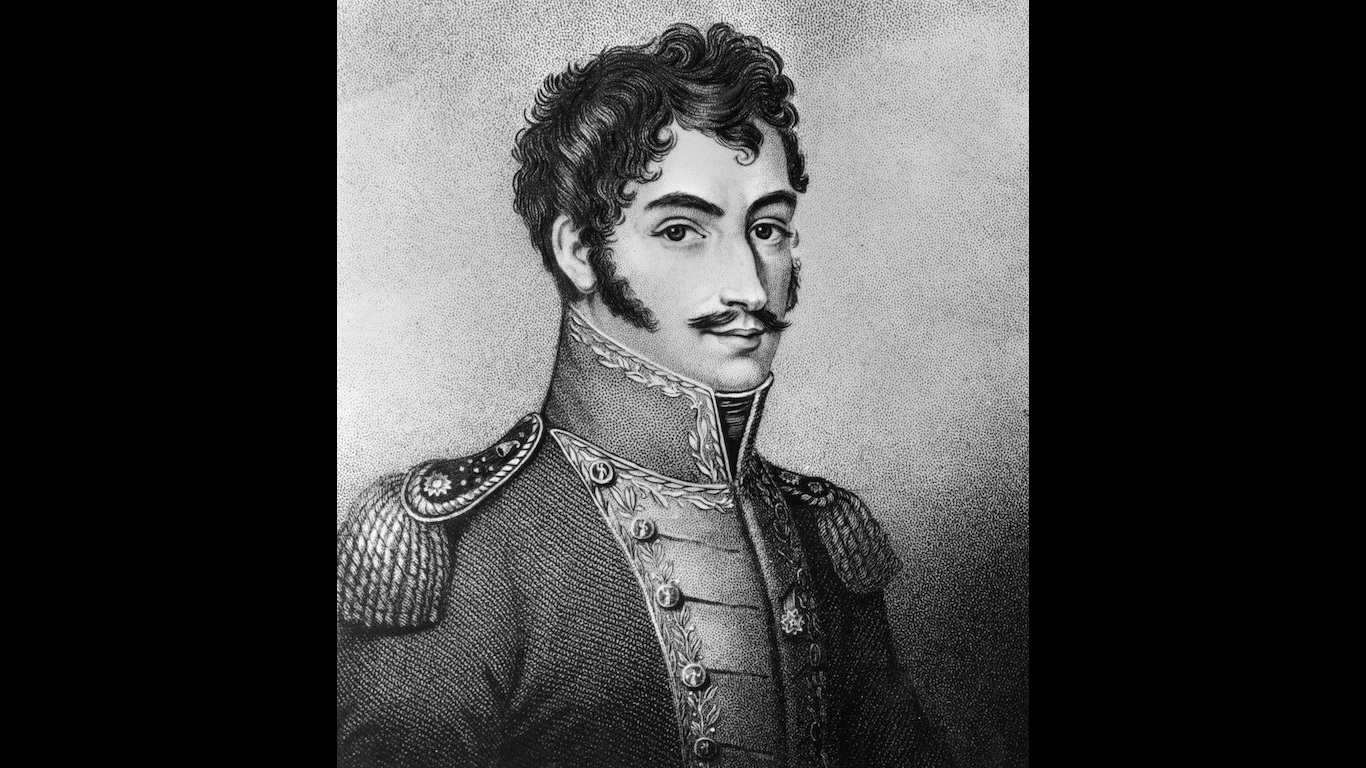
30. Simon Bolivar
> Nation/Territory: South America
> Title: President/Dictator
> Time in power/Reign: 1819-1830
Simón Bolívar, who earned the title The Liberator, was a Venezuelan soldier and statesman who led the revolutions against the Spanish Empire. Bolívar was also president of Gran Colombia from 1819-1830 and dictator of Peru from 1823-1826. The Republic of Bolivia — later shortened to Bolivia — was established in his honor in 1825.
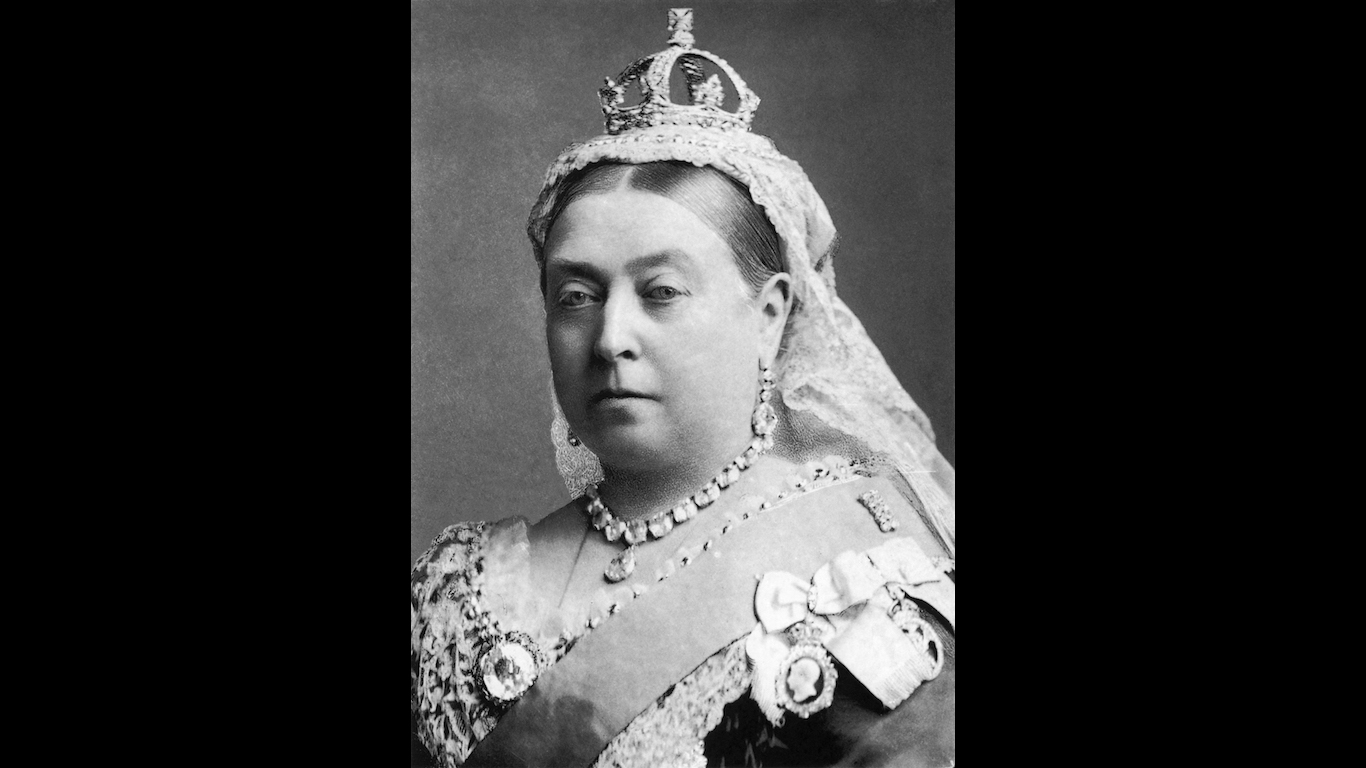
31. Victoria
> Nation/Territory: United Kingdom
> Title: Queen
> Time in power/Reign: 1837-1901
Queen Victoria had one of the longest reigns — 63 years — of any European monarch. She presided over one of the greatest periods for the British Empire, giving her name to an era.
During her time as queen, the empire stayed out of major conflicts, a period called Pax Britannica. Great Britain embarked on grand projects such as the construction of the London Underground, a national railway network, a modern sewer system, as well as the introduction of technological advances such as electricity and the telegraph into public life.
[in-text-ad]
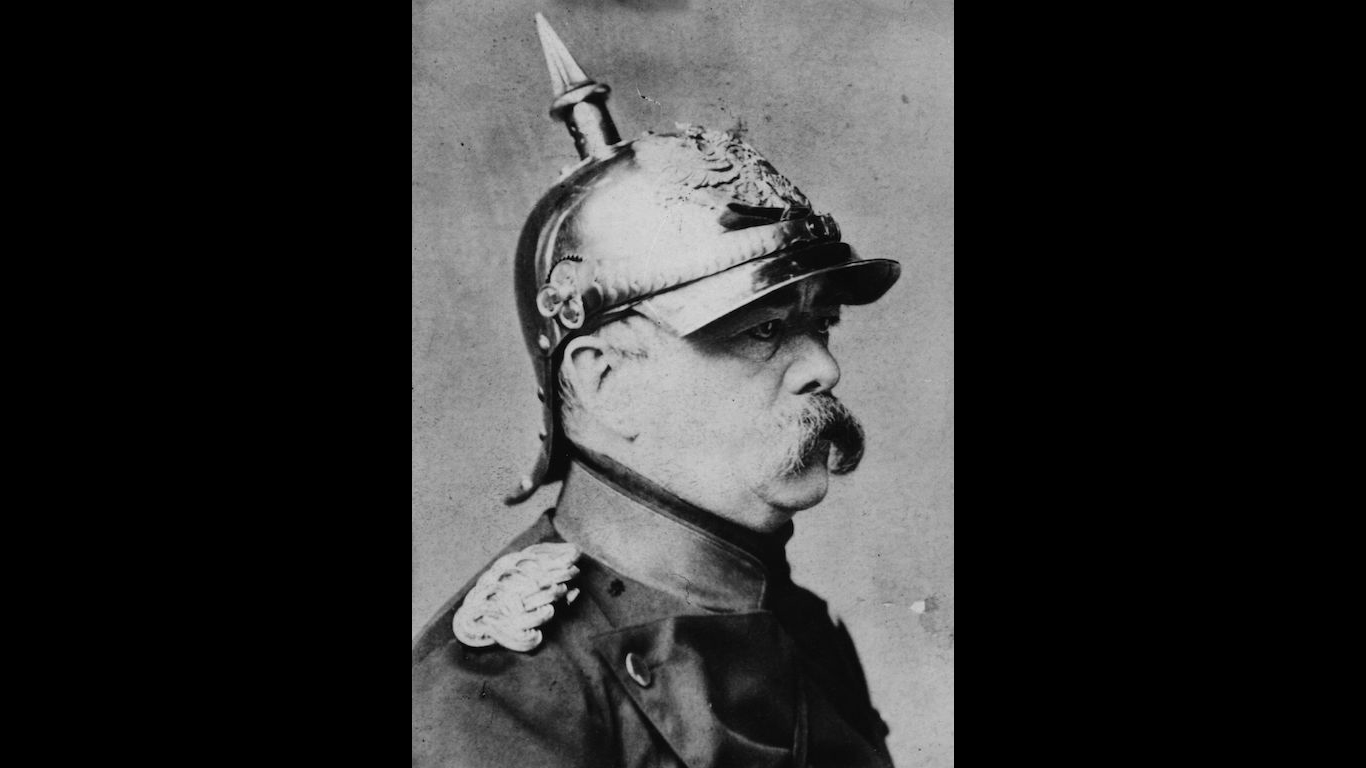
32. Otto von Bismarck
> Nation/Territory: Germany
> Title: Chancellor
> Time in power/Reign: 1871-1890
Otto Von Bismarck was the prime minister of Prussia and founder and first chancellor of the German Empire prior to being forced out in 1890. He is remembered as a master strategist whose military actions led to a unified Germany. Bismarck’s diplomatic dealings led to 20 years of peace in the European continent. However, his authoritarian domestic approach is blamed for the eventual downfall of the empire.
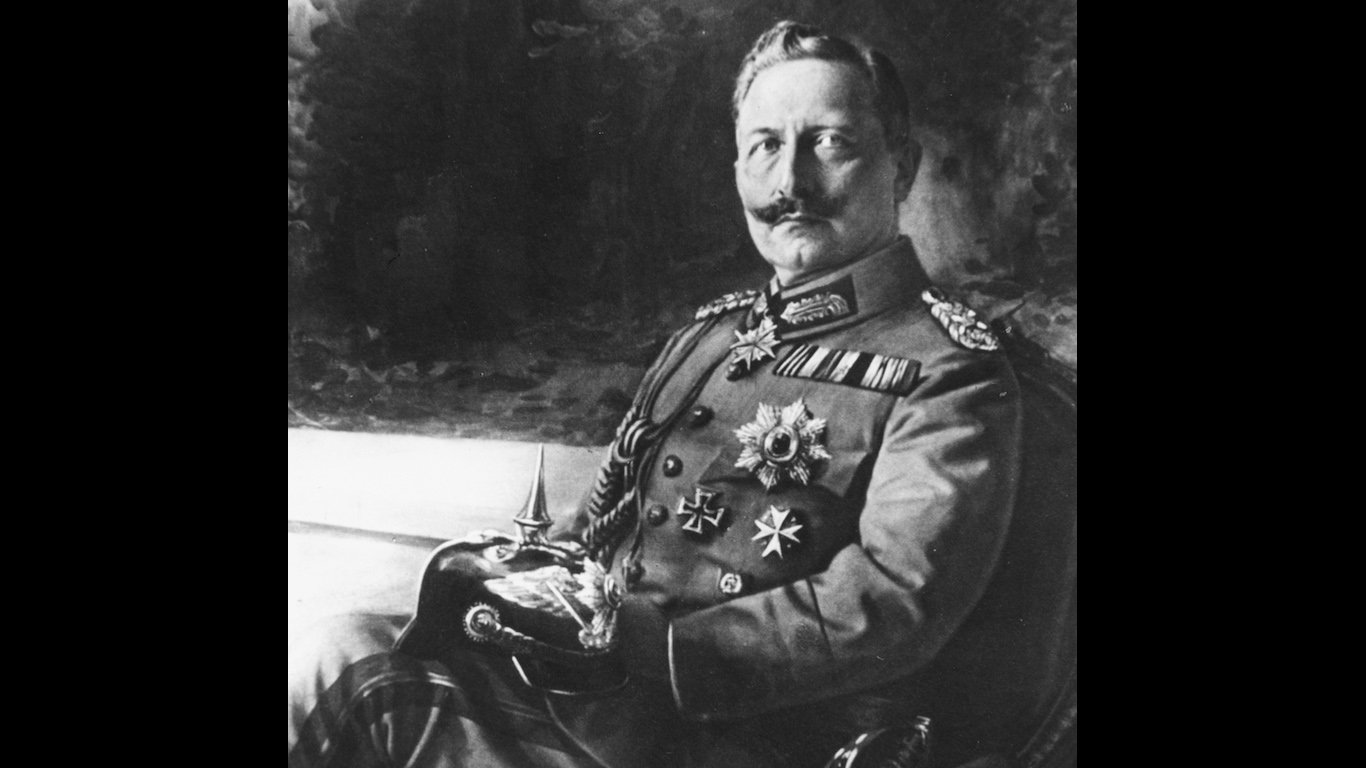
33. Wilhelm II
> Nation/Territory: Germany
> Title: Kaiser
> Time in power/Reign: 1888-1918
Wilhelm II was kaiser of the German Empire for 30 years. His ambitions and militaristic attitudes contributed to the start of WWI. Though he was a grandson of Queen Victoria, he helped put Germany on a path to conflict with Great Britain by expanding the size of the German navy in a direct challenge to the Royal Navy, as well as by growing Germany’s colonial presence in Africa and Asia. Wilhelm pushed Germany’s ally, Austria-Hungary, to severely punish Serbia after Austria-Hungary’s heir-apparent, Franz Ferdinand, was assassinated in Serbia, setting in motion the events that would lead to WWI.

34. Theodore Roosevelt
> Nation/Territory: United States
> Title: President
> Time in power/Reign: 1901-1909
Theodore Roosevelt became the 26th president of the United States following the assassination of William McKinley in 1901. He used the office to accomplish many tasks, including trust-busting, establishing about 200 million acres of nationally protected land, and initiating construction on the Panama Canal.
Roosevelt received the Nobel Peace Prize for his efforts in ending the Russo-Japanese War, and his face was later added to Mount Rushmore.
[in-text-ad-2]
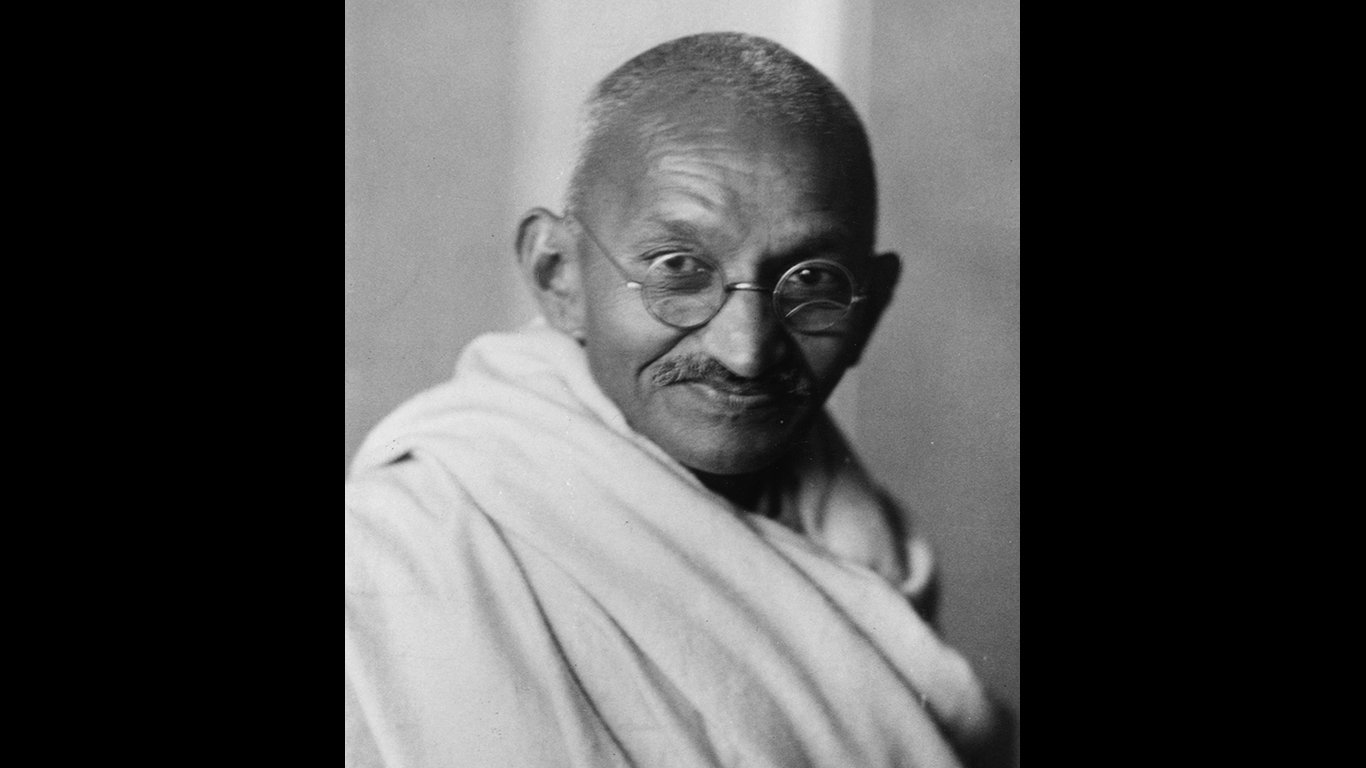
35. Mohandas Gandhi
> Nation/Territory: India
> Title: Mahatma
> Time in power/Reign: 1915-1948
Mohandas Gandhi never held elective office or commanded an army, but he exercised enormous power by using nonviolent resistance to help liberate India from Great Britain after WWII. Gandhi’s strategy of nonviolent opposition to oppression began when he was a young lawyer opposing racism in South Africa in the late 19th and early 20th century. He preached the nonviolent philosophy when he returned to India, supporting boycotts and enduring beatings and arrests until India became independent in 1947.

36. Joseph Stalin
> Nation/Territory: Soviet Union
> Title: Dictator
> Time in power/Reign: 1924-1953
Joseph Stalin was the leader of the Soviet Union, holding power for more than 20 years. His administration is frequently associated with the deaths of up to 20 million people via famine, forced labor, and executions.
Stalin also presided over the Soviet Union’s role in defeating Nazi Germany during World War II. Of the three major powers in the Grand Alliance, Russia endured the vast majority of military casualties.
[in-text-ad]

37. Adolf Hitler
> Nation/Territory: Germany
> Title: Dictator
> Time in power/Reign: 1933-1945
Adolf Hitler rose to power in Germany in 1933 by exploiting German resentment for losing WWI and blaming Jews for Germany’s loss. Over the course of his time in power, Hitler embarked on a mission of conquest and genocide, killing millions of Jews and others he deemed inferior.
WWII was the deadliest conflict in human history, claiming as many as 60 million lives.
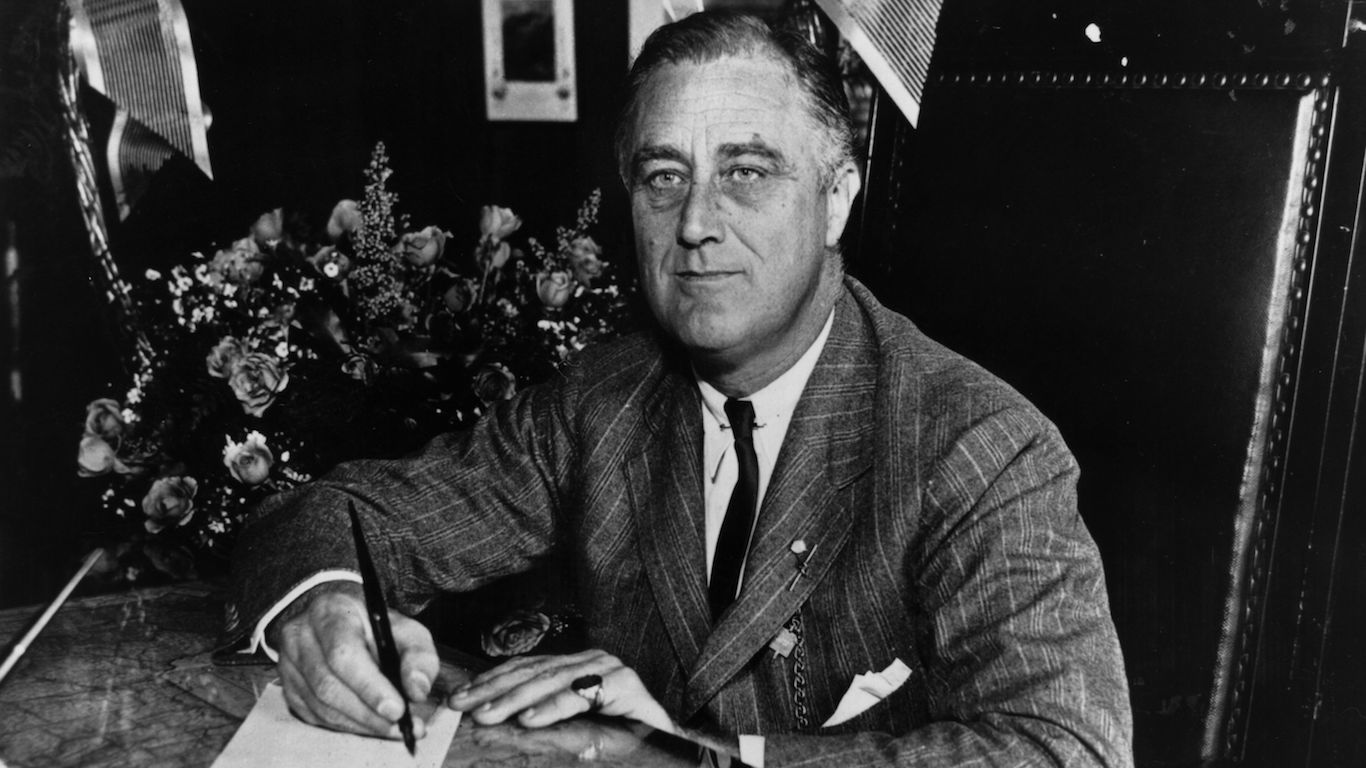
38. Franklin Roosevelt
> Nation/Territory: United States
> Title: President
> Time in power/Reign: 1933-1945
Franklin D. Roosevelt was the longest-serving American president. He gained executive powers to stem the financial collapse of the American economy during the Great Depression. With these powers Roosevelt established the New Deal, a series of reforms that led to programs like Social Security that continue to be used today in the United States.
Roosevelt also presided over the U.S.’s involvement in WWII. He was famously elected to an unprecedented fourth term.
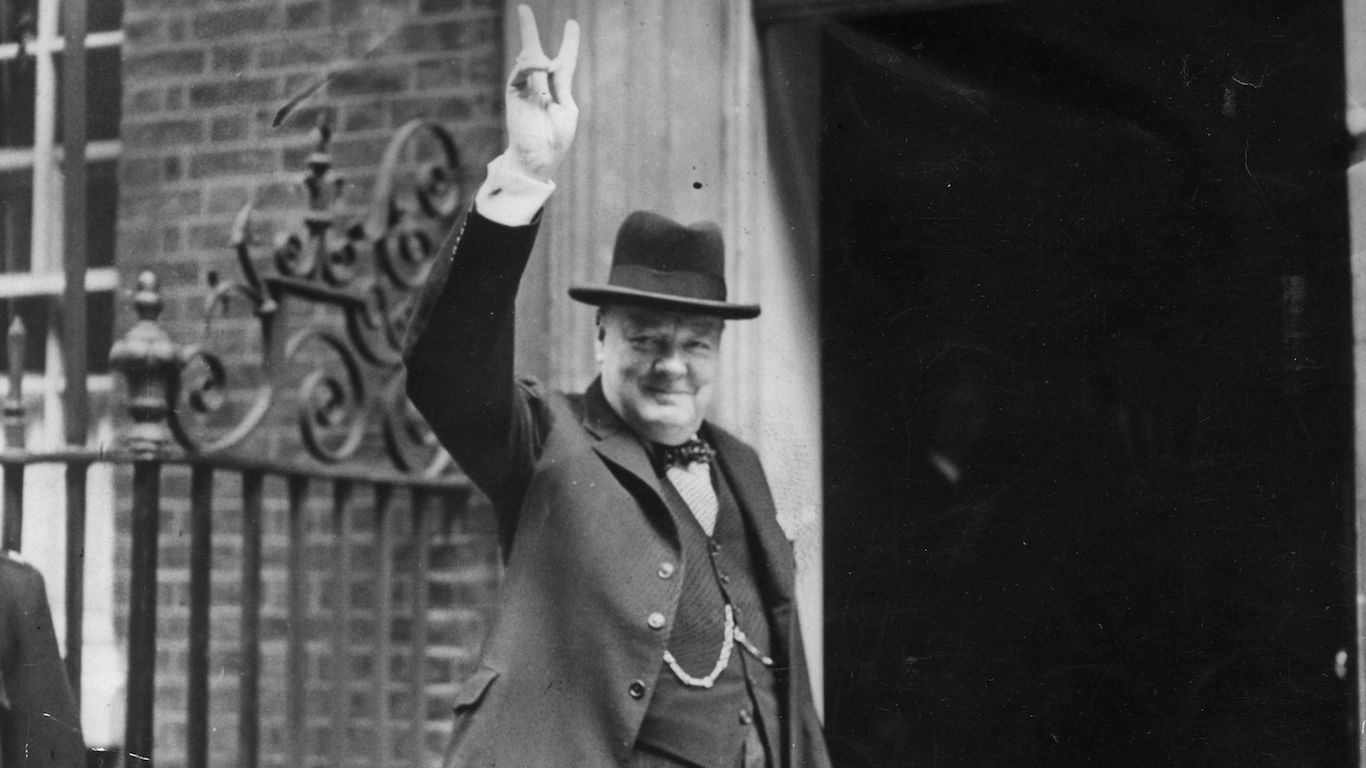
39. Winston Churchill
> Nation/Territory: United Kingdom
> Title: Prime Minister
> Time in power/Reign: 1940-1945, 1951-1955
Winston Churchill was the prime minister of Great Britain during WWII. His inspirational speeches and tenacious bulldog demeanor rallied the nation in its “darkest hour” against the threat from Nazi Germany. Churchill forged a close relationship with American president Franklin D. Roosevelt, and along with FDR met with Soviet leader Joseph Stalin to develop a strategy to defeat fascism and create a postwar Europe.
After he was voted out of office, Churchill returned as prime minister in 1951 just as Queen Elizabeth assumed the throne after her father, King George VI, died in 1952.
[in-text-ad-2]

40. Tojo Hideki
> Nation/Territory: Japan
> Title: Prime Minister/military leader
> Time in power/Reign: 1941-1944
Tojo Hideki was the leader of the Japanese government during WWII and steered his country toward war with the United States. Before the war, Tojo served as an officer in Japan’s force in China and grew in stature as the Japanese conquered an increasing amount of Chinese territory. Tojo supported alliances with Germany and Italy as the nation’s army vice minister and approved of the attacks on the United States and Great Britain as prime minister.
As the war progressed, he gained more control over the government, serving as both prime minister and army minister, and he held other posts that included control of education, commerce and industry, and foreign affairs. After the war he was tried for war crimes and hanged in 1948.

41. Jawaharlal Nehru
> Nation/Territory: India
> Title: Prime Minister
> Time in power/Reign: 1947-1964
Jawaharlal Nehru led the world’s largest democracy in its first years of independence. Before becoming prime minister of India, Nehru was a staunch advocate for Indian autonomy from the British and allied with Mohandas Gandhi. After becoming prime minister, Nehru reluctantly accepted the separation of the Muslim portion of India. He was known for steering India on a path of neutrality, also known as the policy of non-alignment, during the Cold War and kept that position during his time in power until his death in 1964.
[in-text-ad]

42. Mao Zedong
> Nation/Territory: China
> Title: Chairman
> Time in power/Reign: 1949-1976
Mao Zedong is the father of the People’s Republic of China. He ruled the world’s most populous nation for 27 years. After leading the communists to victory over the Nationalist forces of Chiang Kai-shek in 1949, he centralized the government. Mao instituted land reform, pushed for increased literacy and greater access to medical care, and advocated for higher status for women. His attempts to dramatically increase industrial and agricultural production, called the “Great Leap Forward,” have been called failures.

43. Martin Luther King Jr.
> Nation/Territory: United States
> Title: Civil Rights Leader
> Time in power/Reign: 1955-1968
Inspired by the nonviolent philosophy of Mohandas Gandhi, Martin Luther King Jr. led a peaceful movement that advocated for civil rights and justice in the United States. King’s protests and demonstrations were held mostly in the segregated American South, where he was arrested and jailed several times.
His efforts won him the Nobel Peace Prize in 1964, and his oratory on behalf of equality and justice are among the most iconic speeches in American history. He was assassinated in Memphis, Tennessee in 1968.
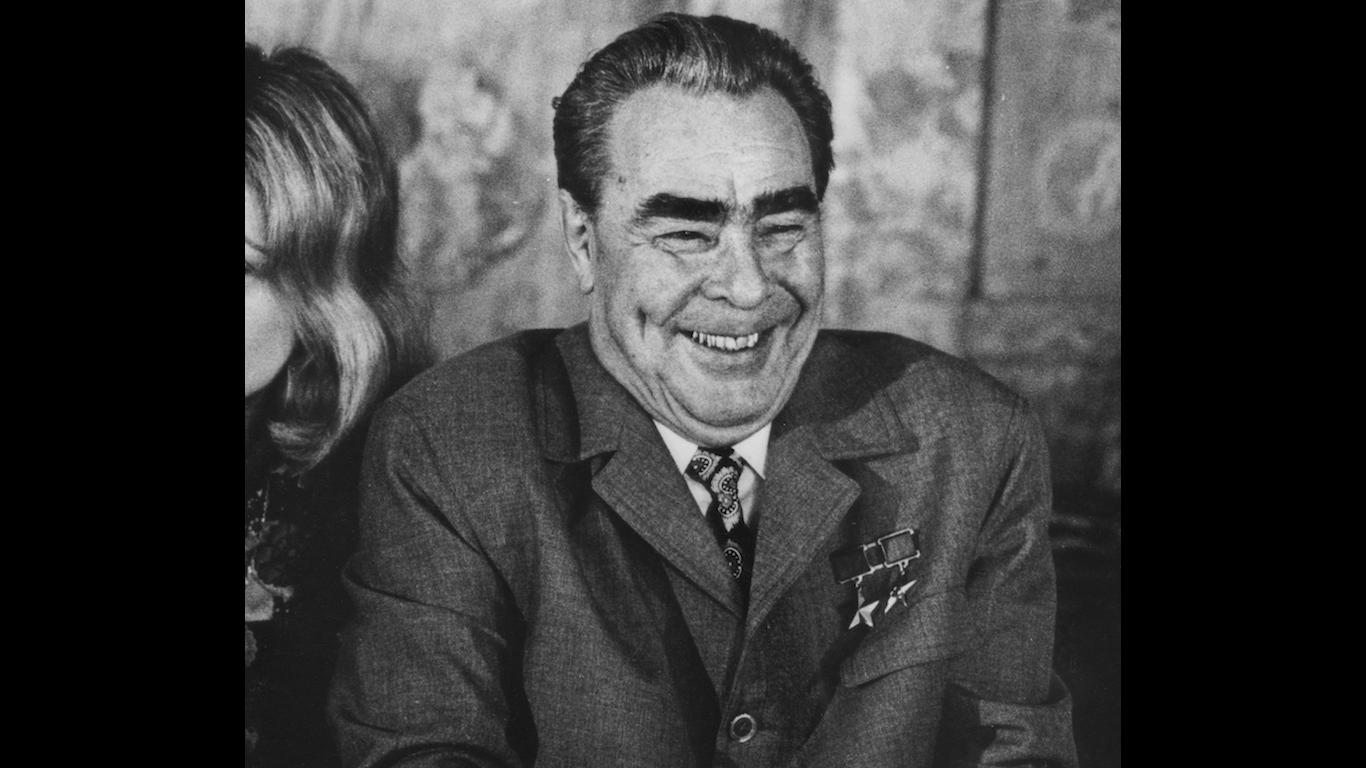
44. Leonid Brezhnev
> Nation/Territory: Soviet Union
> Title: General Secretary/President
> Time in power/Reign: 1964-1982
After Nikita Khrushchev was forced out of power, Leonid Brezhnev became general secretary/president of the Soviet Union in 1964. Under Brezhnev, the Soviet Union built up its nuclear and conventional military capability and exercised an iron-fisted control over Eastern Europe, as demonstrated by its suppression of the attempts at liberalization of Czechoslovakia in 1968. During Brezhnev’s tenure, the Soviet Union invaded Afghanistan.
[in-text-ad-2]

45. Indira Gandhi
> Nation/Territory: India
> Title: Prime Minister
> Time in power/Reign: 1966-1977, 1980-1984
Indira Gandhi was the daughter of India’s first prime minister, Jawaharlal Nehru. Two years after he left as PM in 1964, she became India’s prime minister. Gandhi served three terms from 1966 to 1977 during which she presided over agricultural reforms and led a successful war against Pakistan. She centralized power, and made enemies with her increasing authoritarianism in which she curtailed Indians’ constitutional rights. After a three-year hiatus, she returned to power in 1980, and four years later was assassinated by her bodyguards.

46. Deng Xiaoping
> Nation/Territory: China
> Title: Paramount leader
> Time in power/Reign: 1978-1989
Deng Xiaoping became the most powerful man in the world’s most populous nation following the death of Mao Zedong in 1976. Deng was a pragmatic leader who shifted away from his predecessor’s orthodox communist ideology by advocating for market reforms, decentralized planning, and more flexibility in planning goals. These policy changes contributed to higher living standards in China and put the nation on a course to becoming the world’s second largest economy.
[in-text-ad]
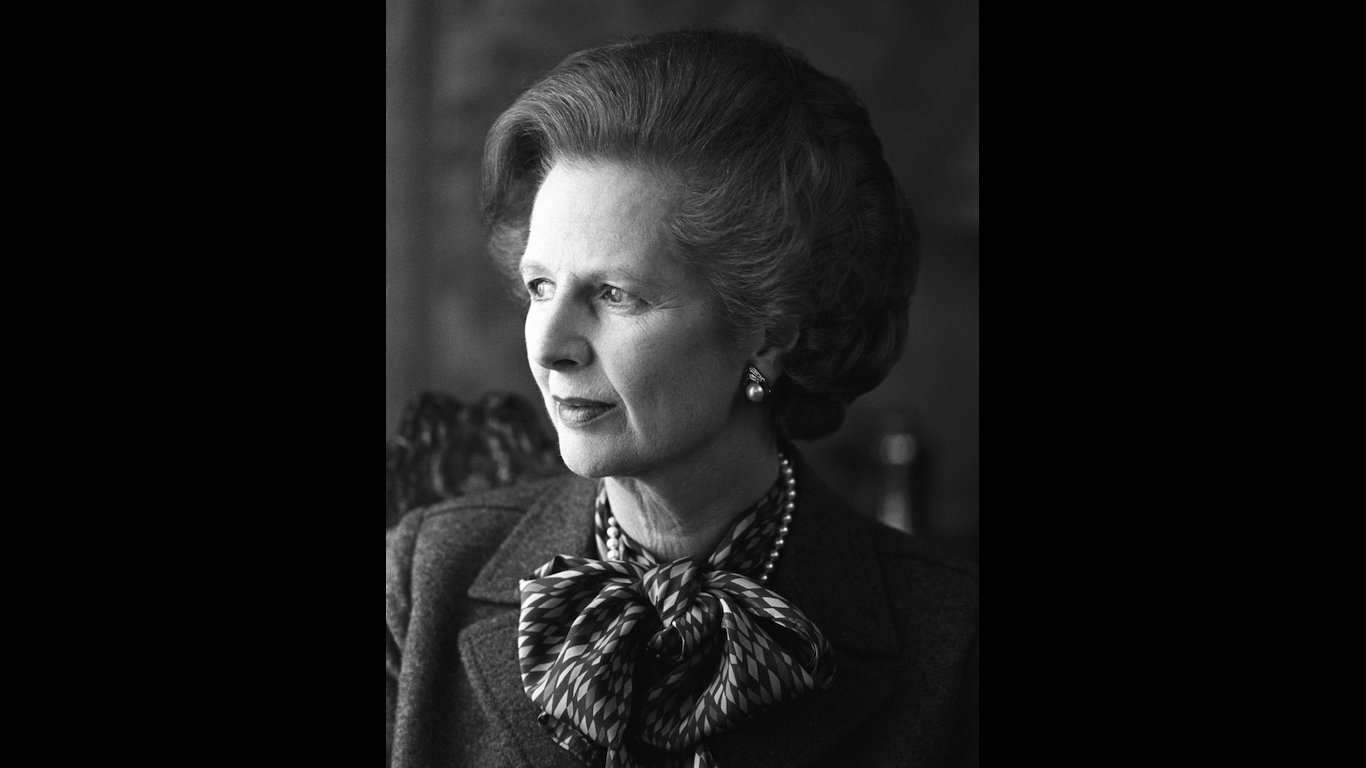
47. Margaret Thatcher
> Nation/Territory: United Kingdom
> Title: Prime Minister
> Time in power/Reign: 1979-1990
Margaret Thatcher became Great Britain’s first female prime minister in 1979, serving as PM for three terms. Her strongly held free market beliefs put her at odds with unions, and she championed the deregulation of financial markets. Her brief and successful war to regain the Falkland Islands in 1982 from Argentina restored British pride and raised her popularity among the British people. Thatcher was also a staunch Cold War ally of the United States who forged a special relationship with American President Ronald Reagan.
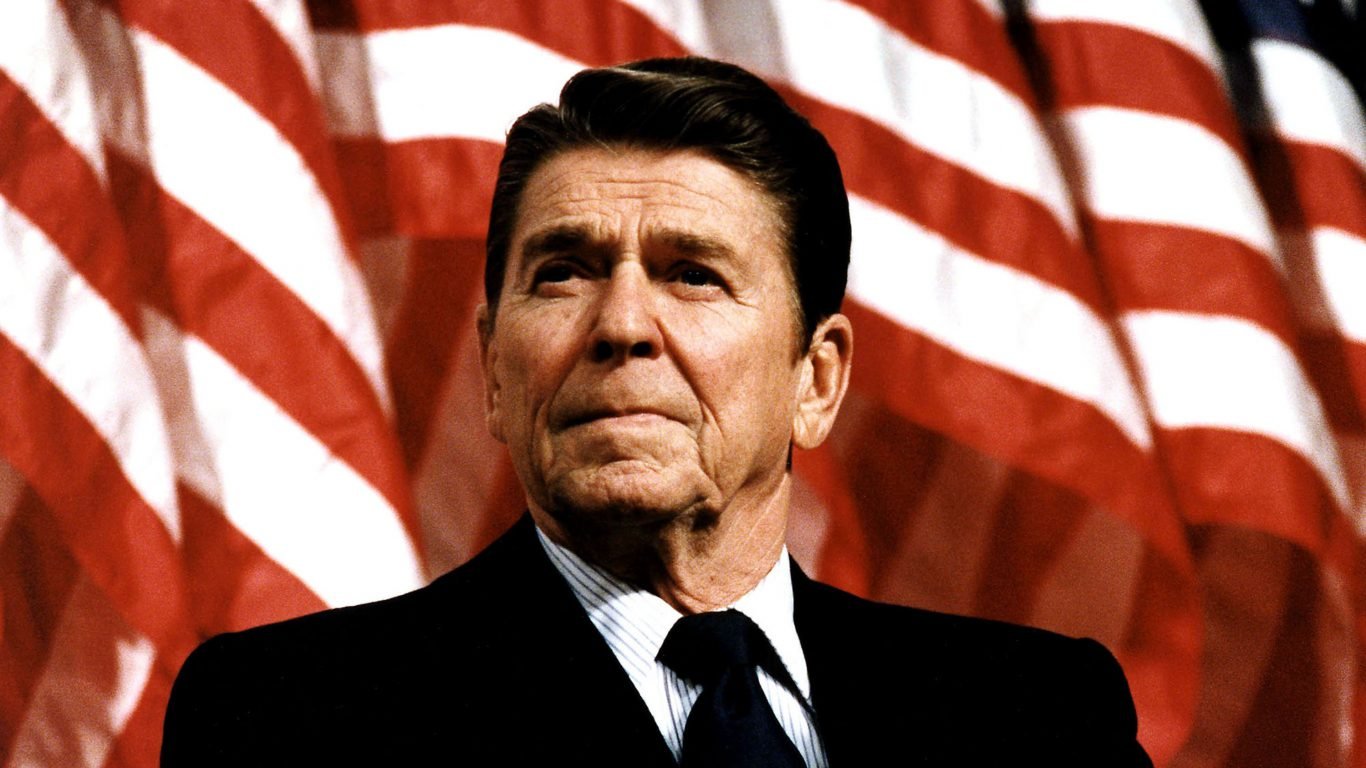
48. Ronald Reagan
> Nation/Territory: United States
> Title: President
> Time in power/Reign: 1981-1989
Former actor Ronald Reagan won the presidency in 1980 on a platform of smaller government and taking a peace-through-strength approach toward the Soviet Union. After surviving an assassination attempt, Reagan succeeded in passing a plan to stimulate the economy by cutting taxes and bolster defense spending. Even as defense expenditures rose, Reagan negotiated treaties with Soviet leader Mikhail Gorbachev that limited certain classes of nuclear missiles.
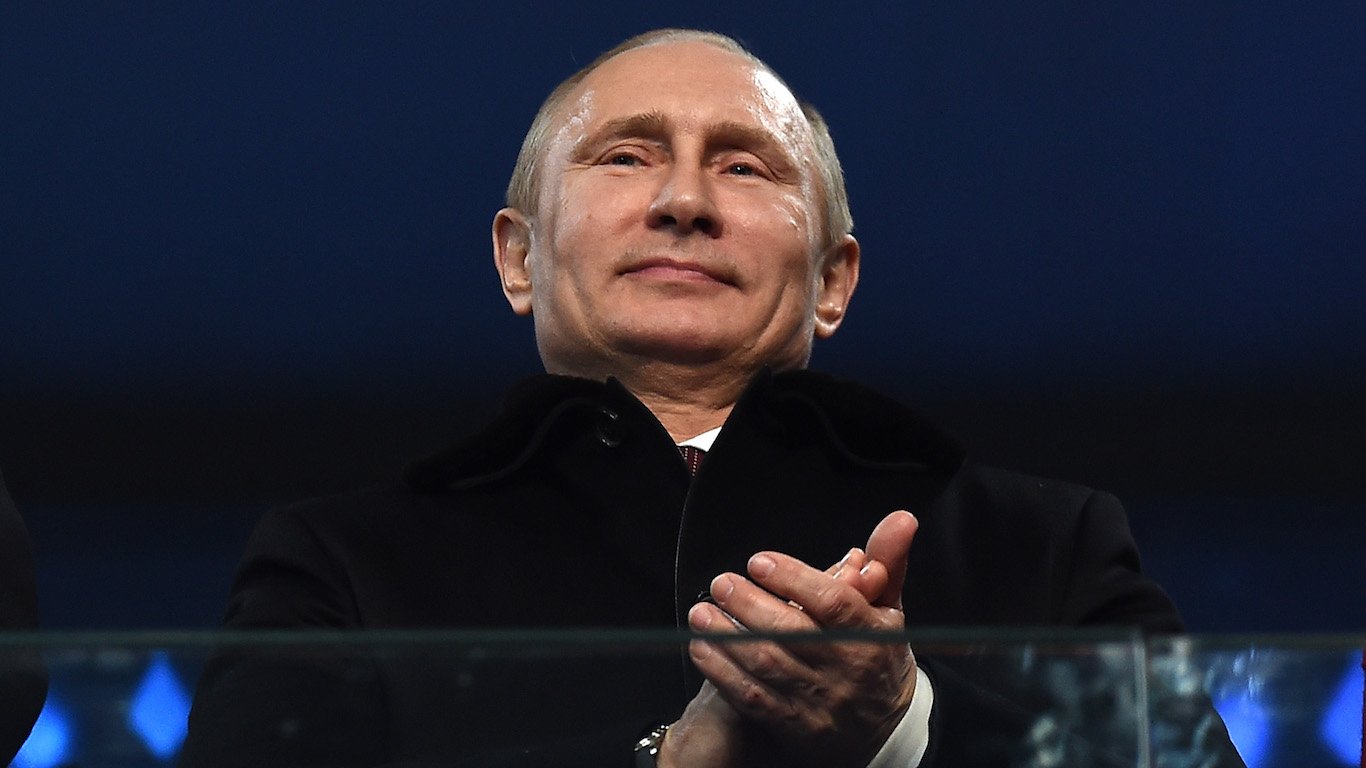
49. Vladimir Putin
> Nation/Territory: Russia
> Title: President
> Time in power/Reign: 2000-2008, 2012-present
Vladimir Putin has been president of Russia since 2000, except for four years where he served as prime minister. Putin has been attempting to restore Russian military and political influence. In 2020, the constitution of Russia was changed thru a referendum vote, allowing Putin’s term to extend through 2036. The previous limit was through 2024. Putin’s opponents claimed the outcome was rigged.
[in-text-ad-2]
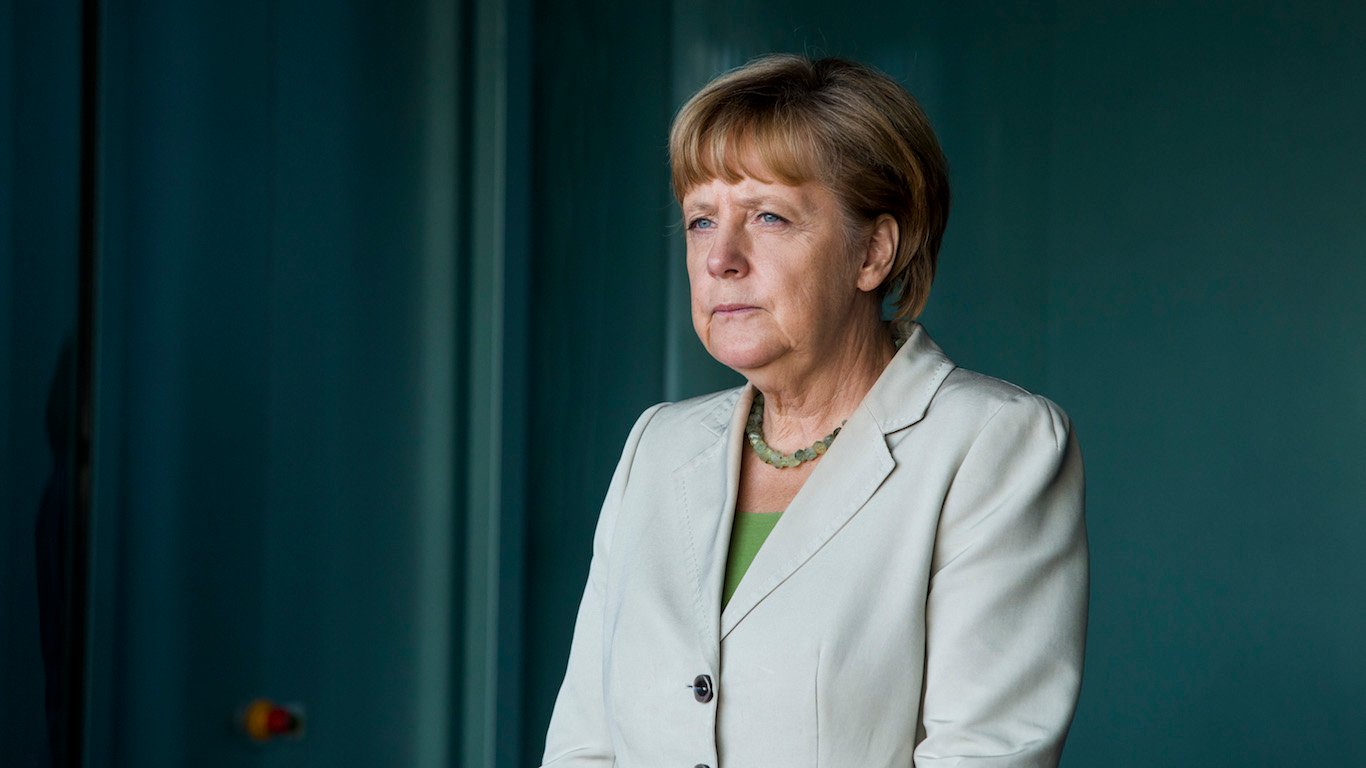
50. Angela Merkel
> Nation/Territory: Germany
> Title: Chancellor
> Time in power/Reign: 2005-present
Angela Merkel, Germany’s first female leader, has served as chancellor of Germany since 2005. Her fourth and final term as chancellor will end in 2021. Merkel has been called “the de facto leader of the European Union” and received kudos for her handling of the European financial crisis, showing political courage in advocating for fiscal austerity measures and unpopular budget reductions. Domestically, Merkel is also credited with transitioning the country to alternative energy sources and introducing a minimum wage.
Sponsored: Find a Qualified Financial Advisor
Finding a qualified financial advisor doesn’t have to be hard. SmartAsset’s free tool matches you with up to 3 fiduciary financial advisors in your area in 5 minutes. Each advisor has been vetted by SmartAsset and is held to a fiduciary standard to act in your best interests. If you’re ready to be matched with local advisors that can help you achieve your financial goals, get started now.
Thank you for reading! Have some feedback for us?
Contact the 24/7 Wall St. editorial team.
 24/7 Wall St.
24/7 Wall St.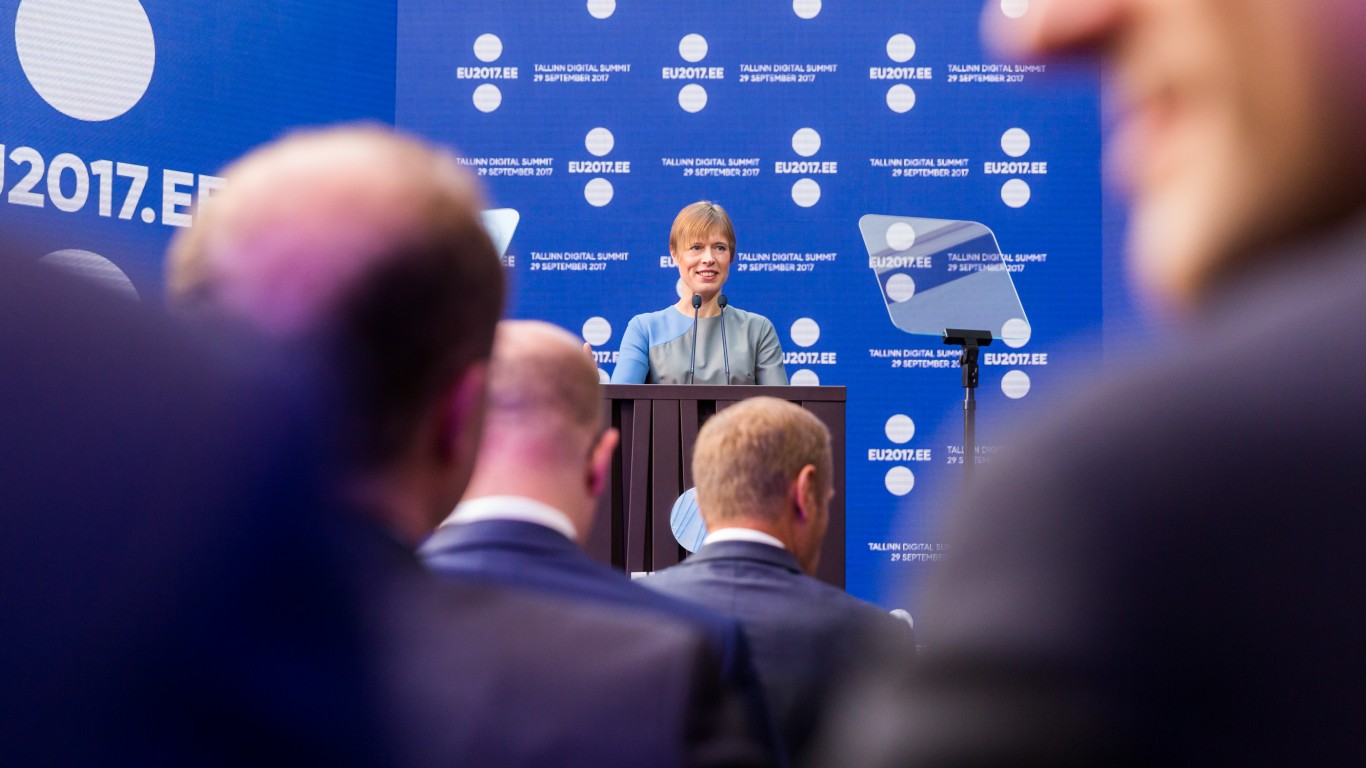 24/7 Wall St.
24/7 Wall St.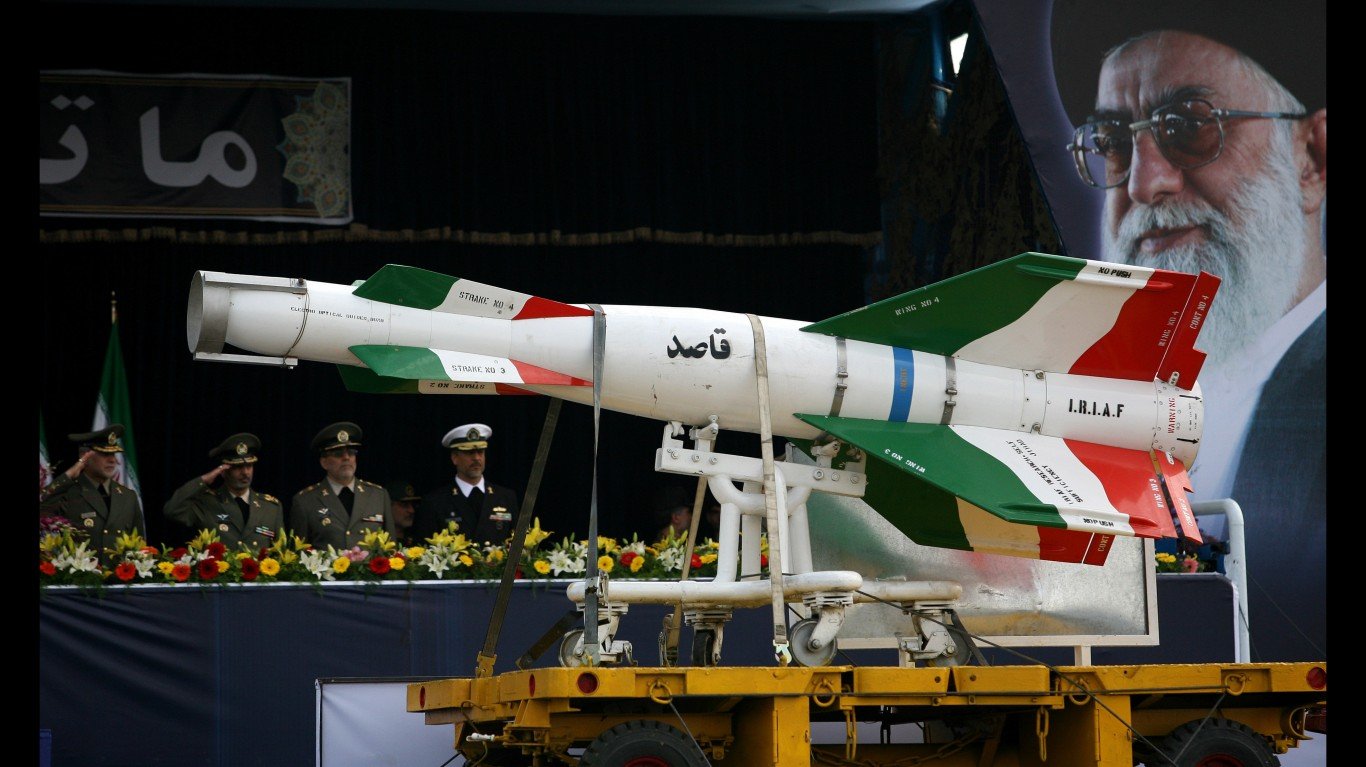 24/7 Wall St.
24/7 Wall St.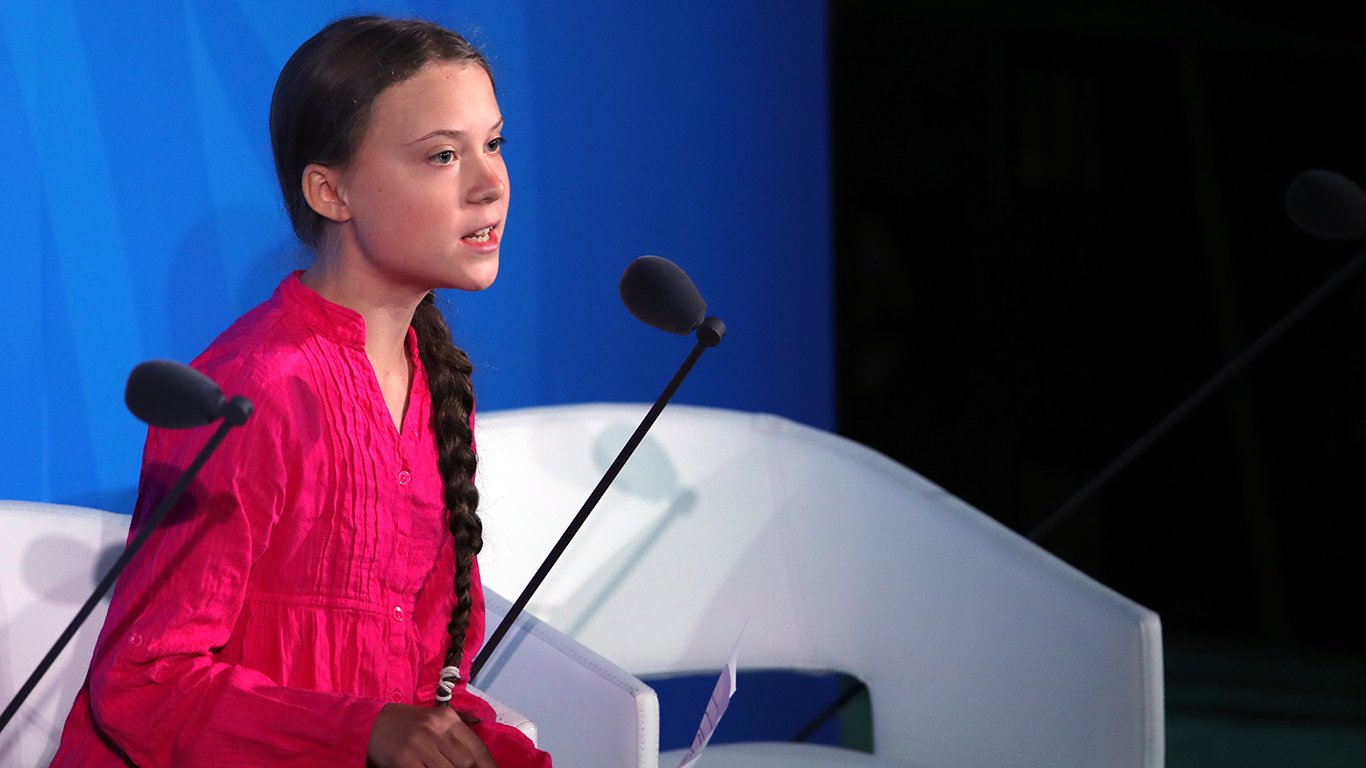 24/7 Wall St.
24/7 Wall St. 24/7 Wall St.
24/7 Wall St. 24/7 Wall St.
24/7 Wall St.


